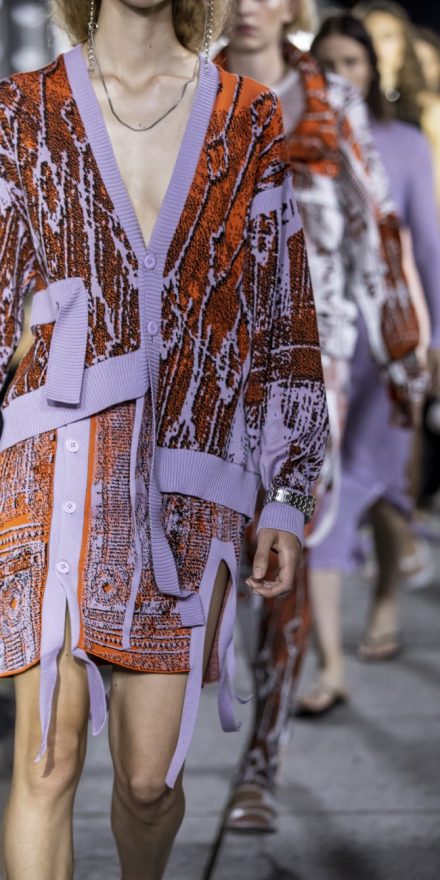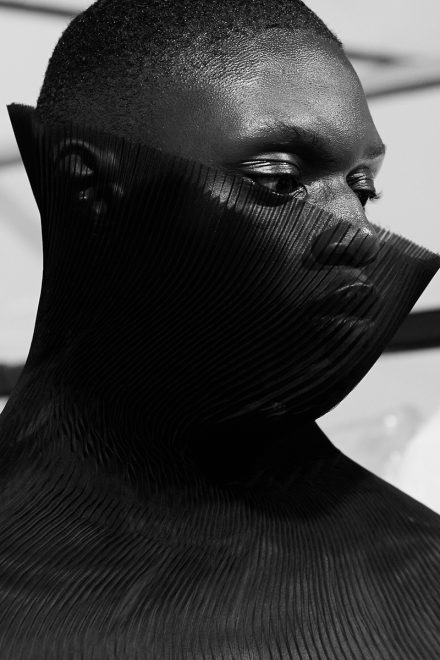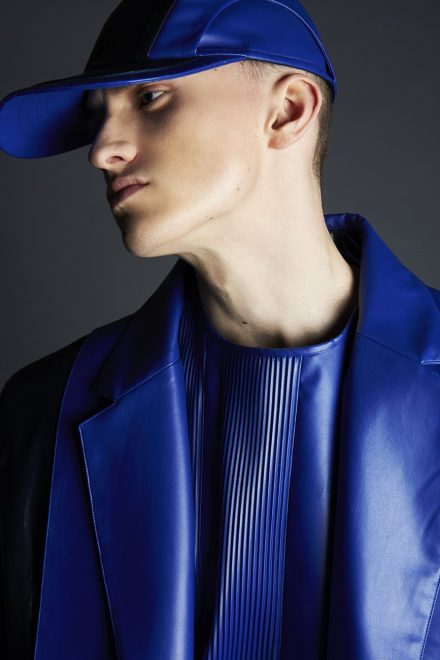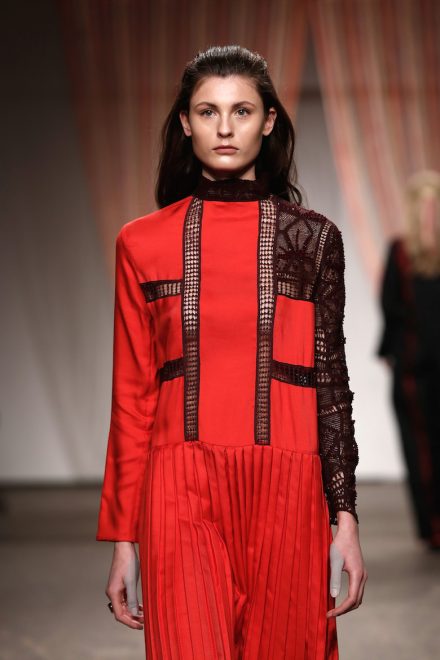In December, 18 emerging designers from six renowned European fashion schools gathered in Portugal to compete in the 2024 MODAPORTUGAL LINKS Fashion Design Competition at Porto’s opulent, fresco-adorned Stock Exchange Palace.
Representing Aalto University, Institut Français de la Mode, Polimoda, HEAD Genève, London College of Fashion and Modatex, each presented a collection to a panel of leading fashion directors and creatives, who selected a winner from each school, and one overall.
On the runway sidelines, the designers spoke to ΠMagazine about concept, craft, and sourcing inspiration. See all the looks and the ideas behind them, below.
HEAD GENÈVE, SWITZERLAND
Overall award, Jury award
MAXENCE GUENIN
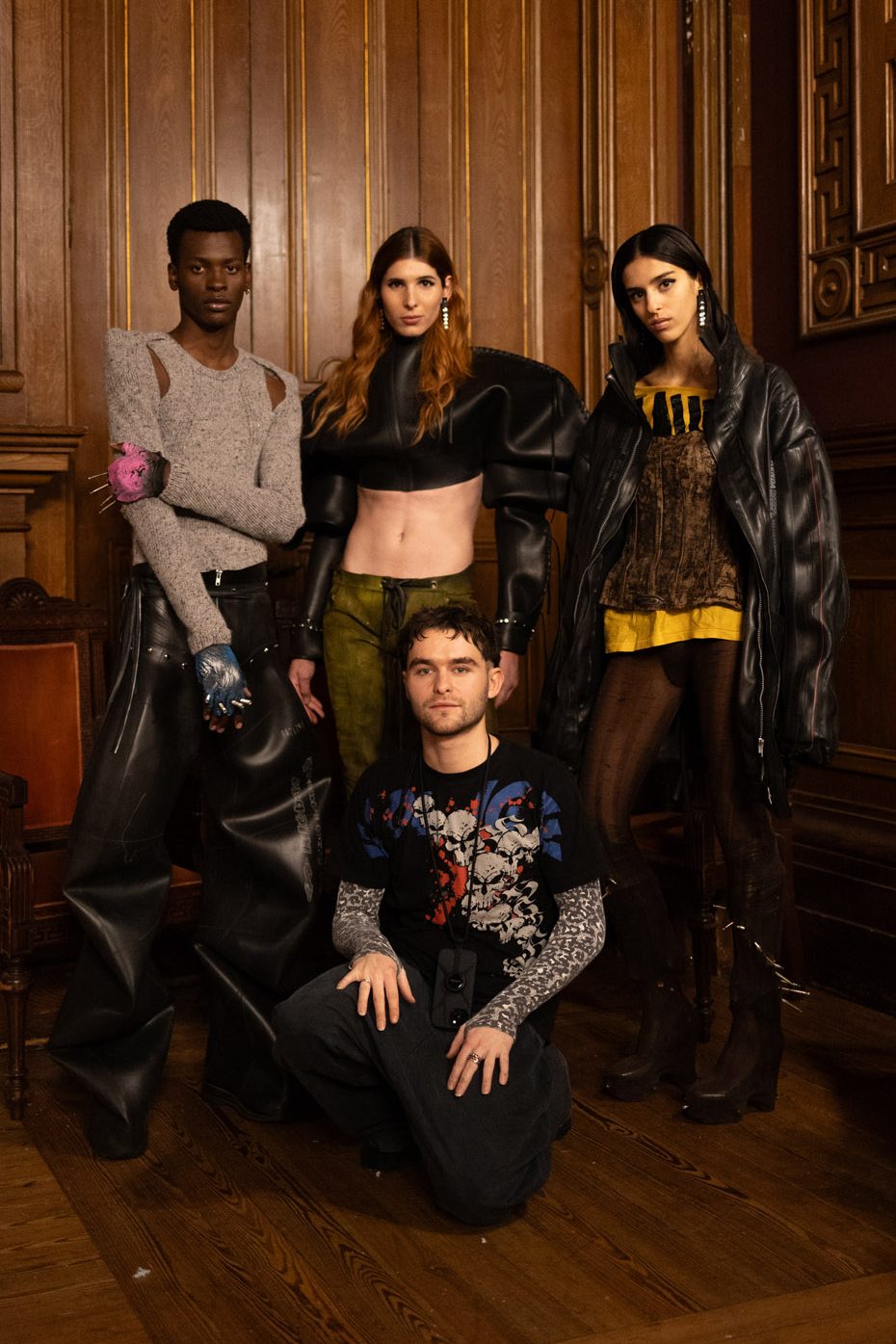
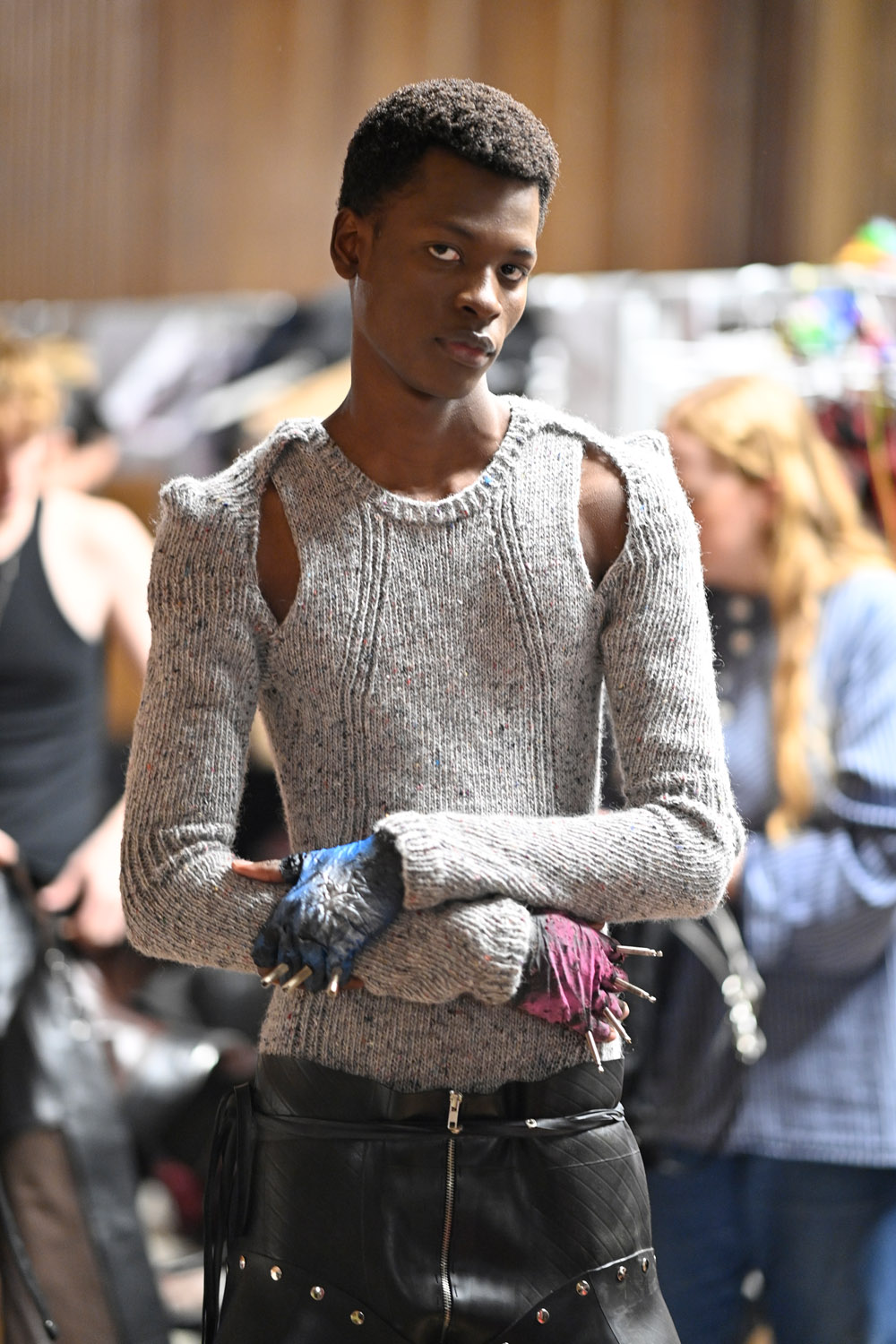
LEFT
Photography – Luís Miguel Fonseca
RIGHT
Photography – Pretonubranco
Maxence Guenin’s collection recycles industrial products like tractor tires, and his own previous works, reinterpreting them into garments whose form is dictated by the raw material’s characteristics.
“I’m not trying to put a new garment into the world. Visually, it stays industrial – for example, preserving the roundness of the tractor tubing – but when you look at the details, you see texture, hand stitching, dying techniques with coffee grounds.”
BRIGITTE DA CONCEIÇÃ0
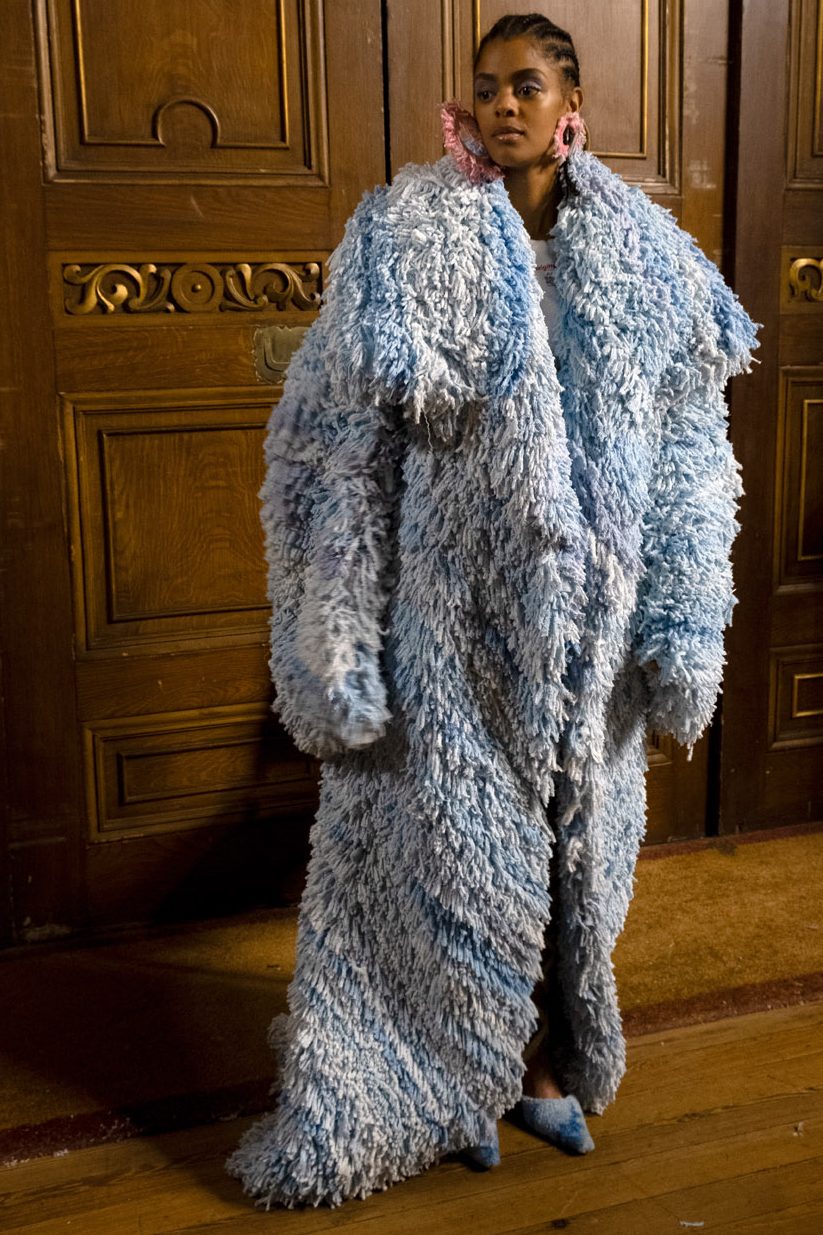
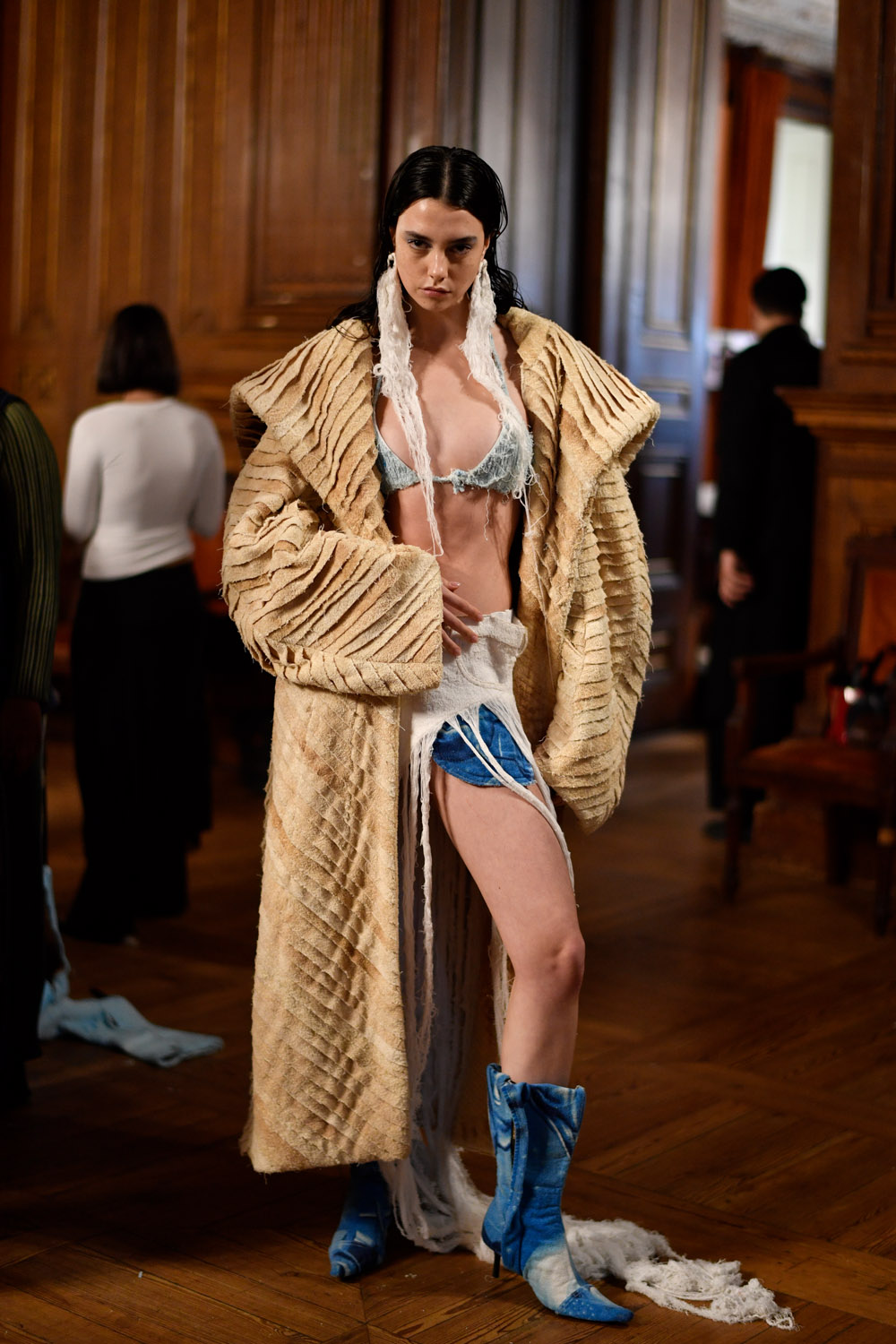
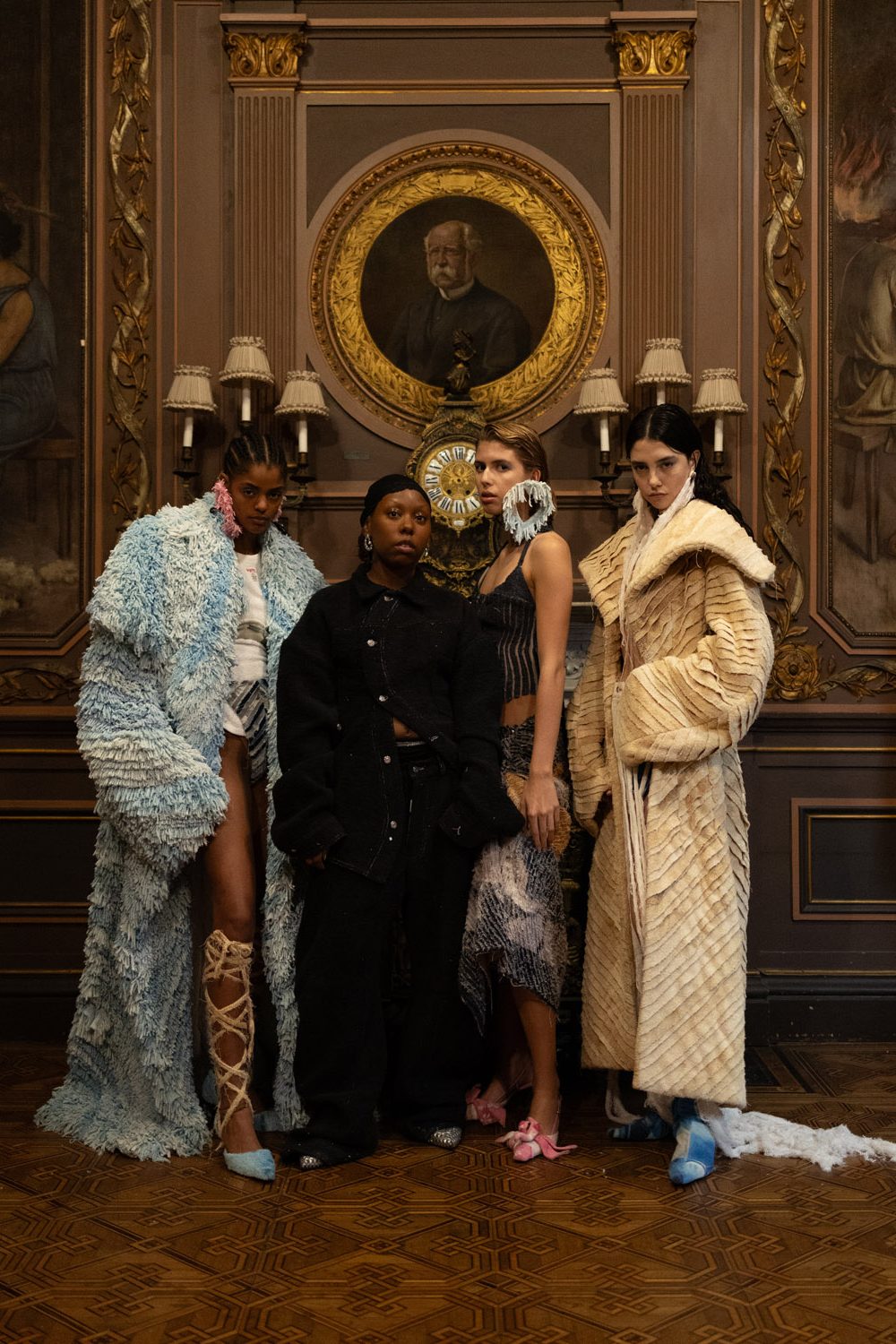
LEFT
Photography – Lena Hunter
RIGHT
Photography – Pretonubranco
BOTTOM
Photography – Luís Miguel Fonseca
Brigitte da Conceição repurposes towels sourced from hotels, laundries and individuals into a medium for storytelling and self-expression. Through artisanal techniques traditionally passed down between women, of dyeing, embroidery, waxing, and glazing, Conceição breathes new life into overlooked everyday materials, reimagining them as meaningful fashion objects.
“This entire collection is about the empowerment of women.”
JEREMY CURRAT
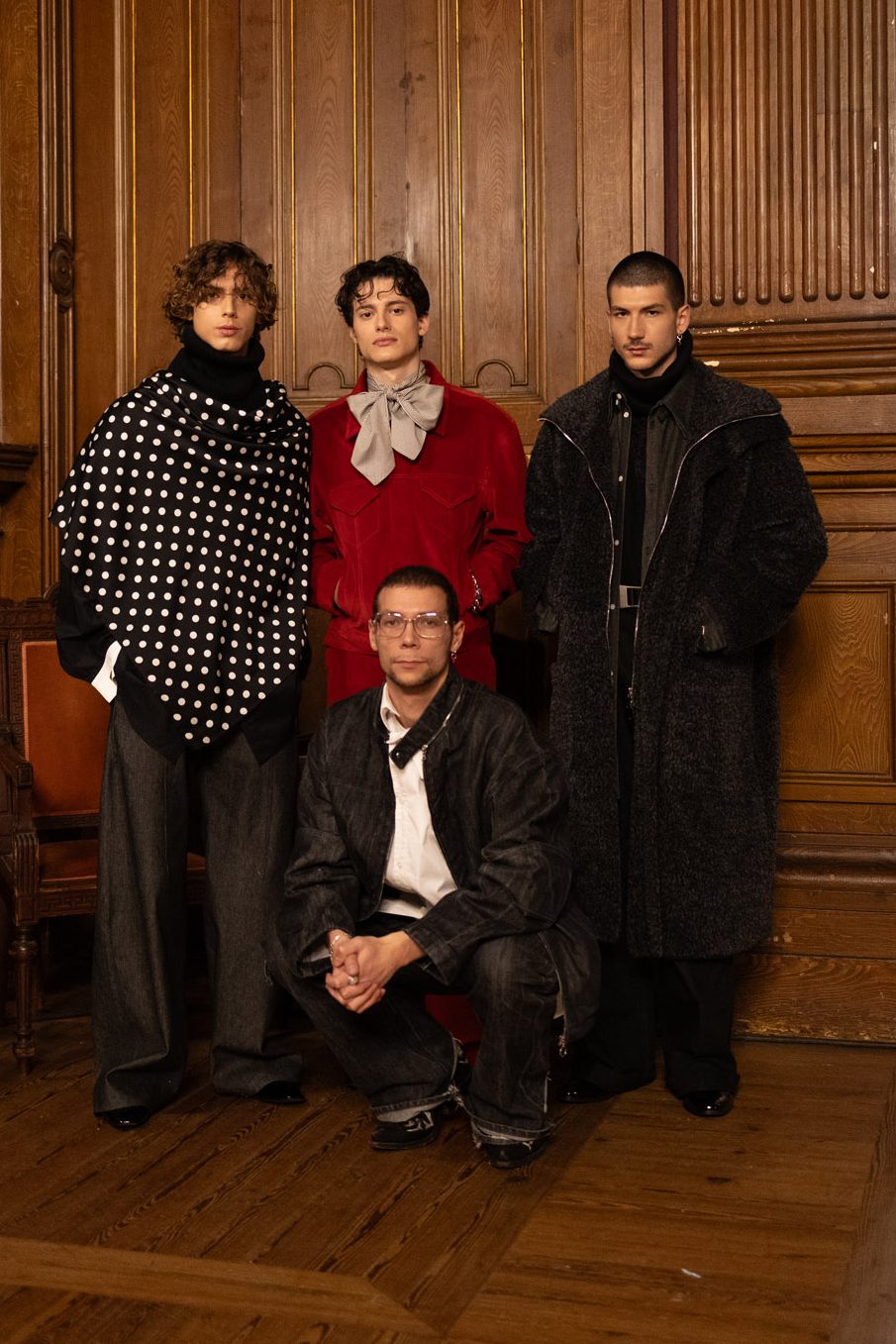
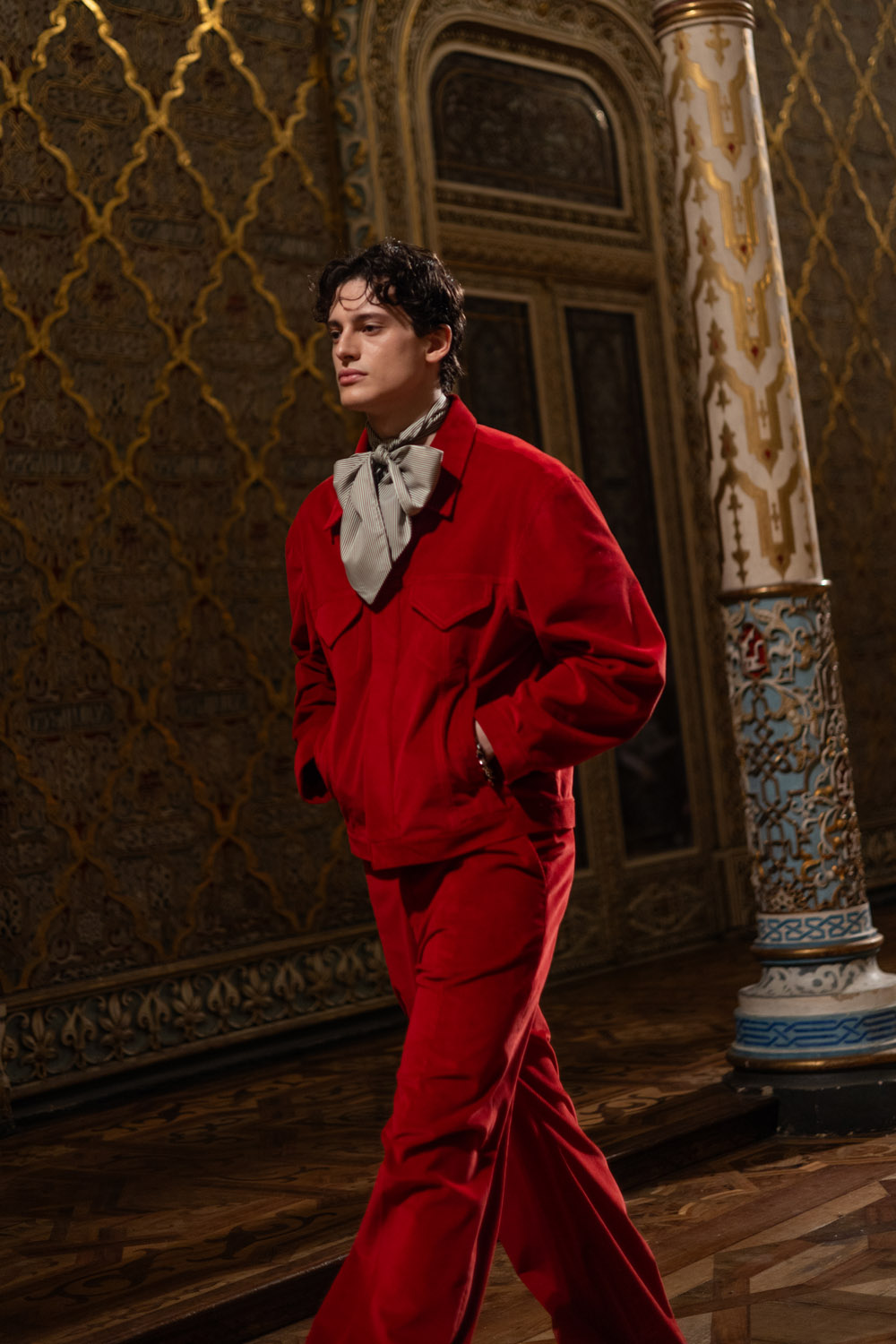
LEFT
Photography – Luís Miguel Fonseca
RIGHT
Photography – Inês Brochado
Jeremy Currat‘s Teenage Business collection depicts the challenging transition period between carefree adolescence and the responsibilities and codes of adulthood. Combining poorly knotted ties, thrown-on slouchwear and the almost-fitted look of a borrowed office wardrobe, Currat presents an aesthetic that blends clumsy nonchalance with chic delicacy.
“This collection explores a fine line in growing up that everybody crosses. I used shirting, denim and jersey to contrast the idea of the job interview with the 15-year-old skater who has to face the adult world.”
AALTO UNIVERSITY, FINLAND
Jury award
NEŽA SIMČIČ
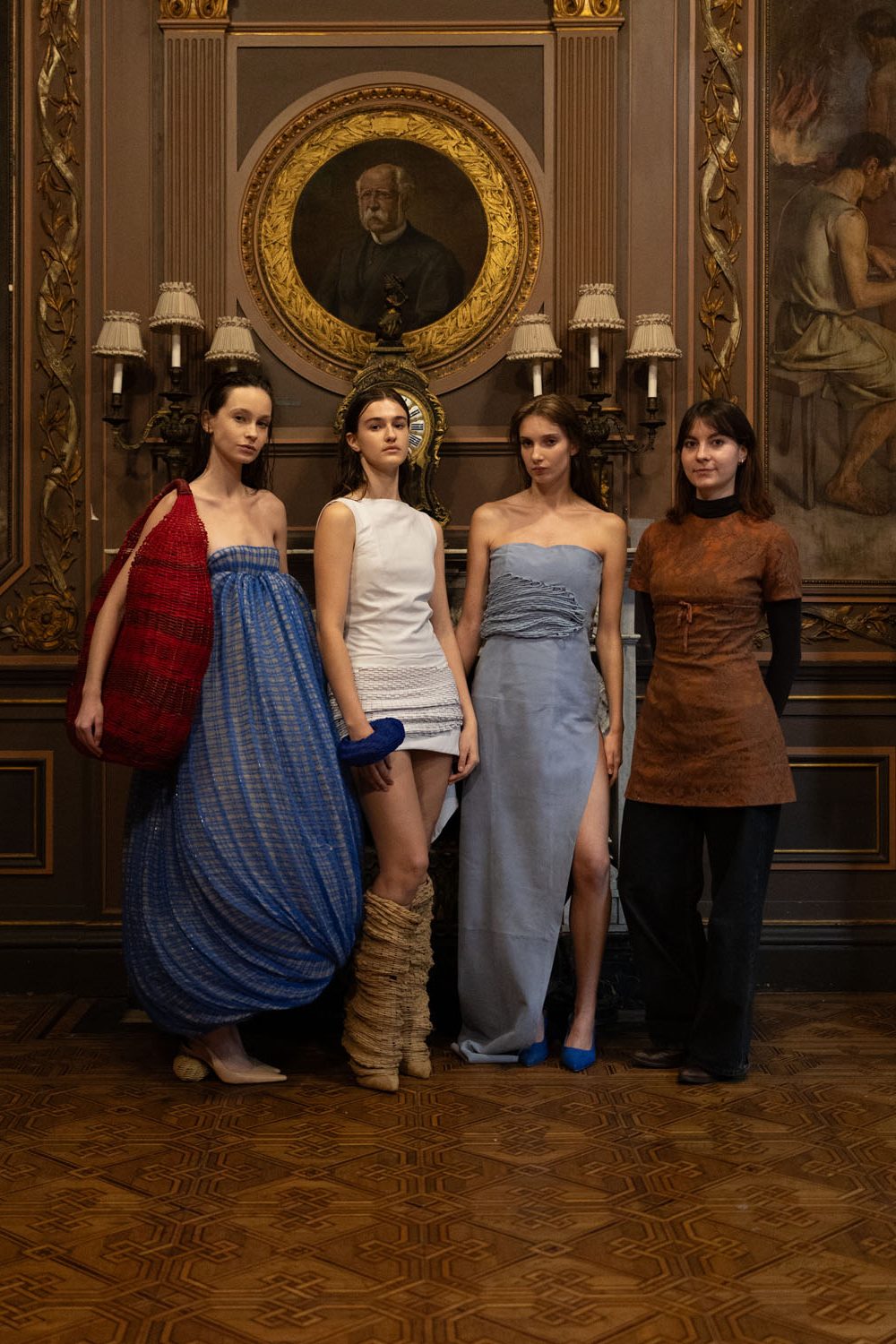
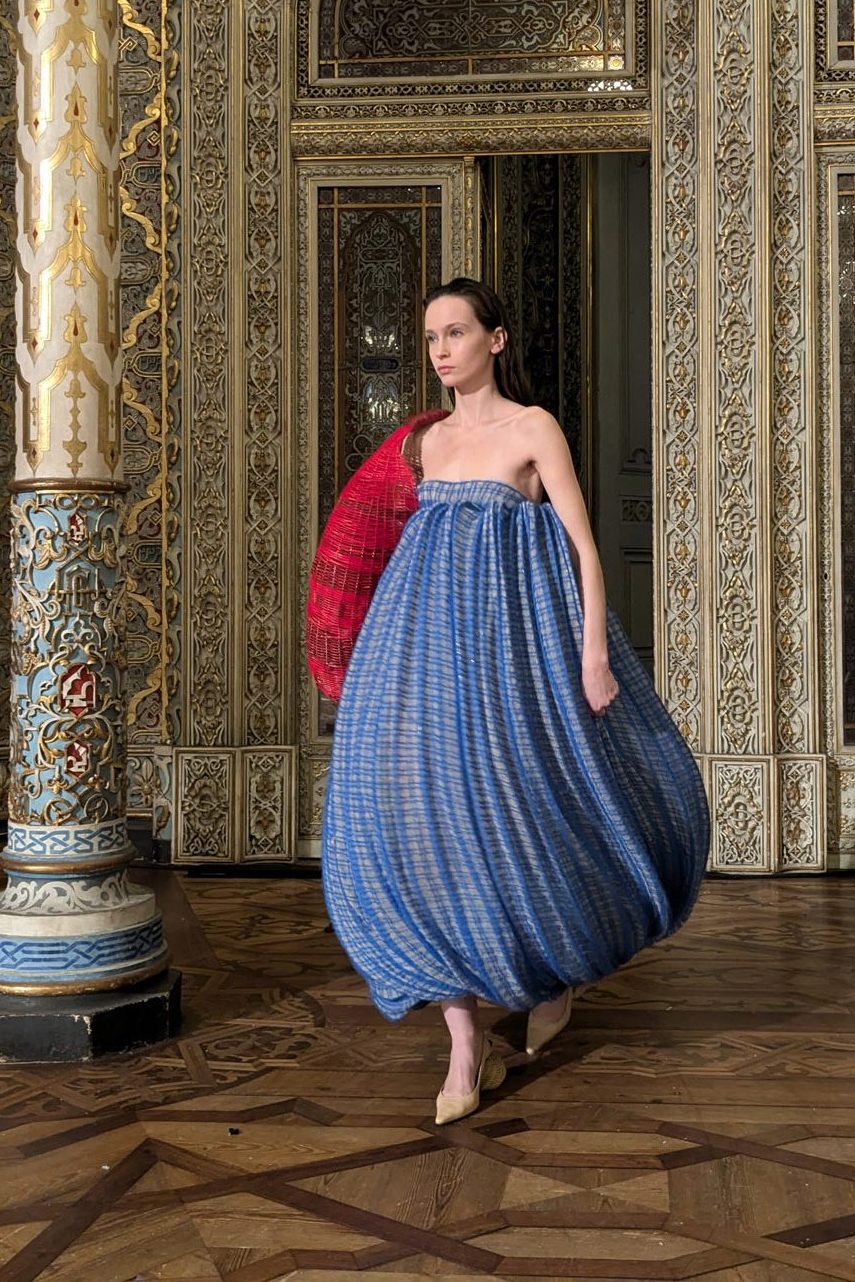
LEFT
Photography – Luís Miguel Fonseca
RIGHT
Photography – Lena Hunter
Neža Simčič’s craft-based couture reflects the basketry and woodenware traditions of Slovenia. Her MARA collection incorporates local materials like wood, reindeer leather, and linen into wearable art that honours her memories of knitting with her grandmother.
“I went to the birthplace of basketry in Slovenia and learned to weave. You soak the wood through the night to make it pliable, and then must work very fast. I later incorporated leather cord and allowed the technique to narrate the work.”
APOLLO DA COSTA DORIA
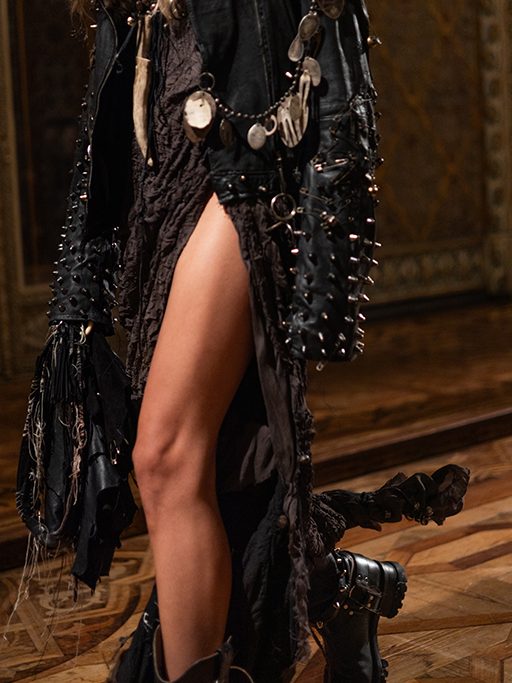
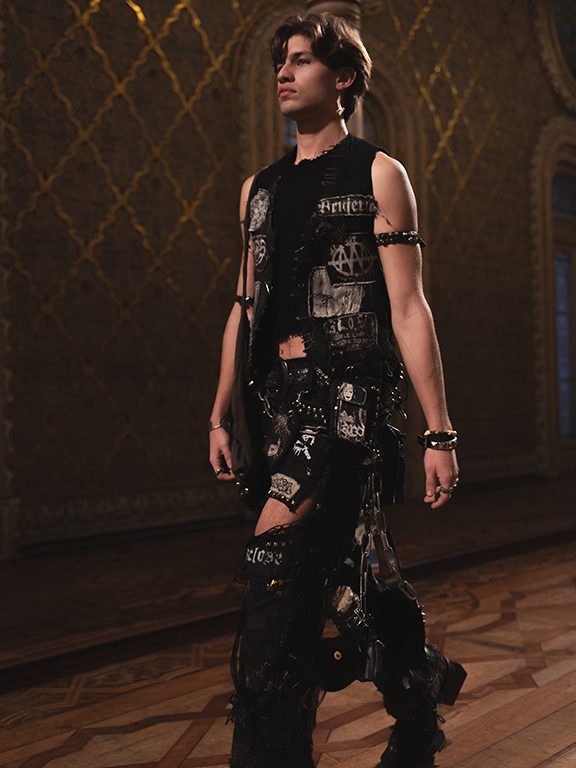
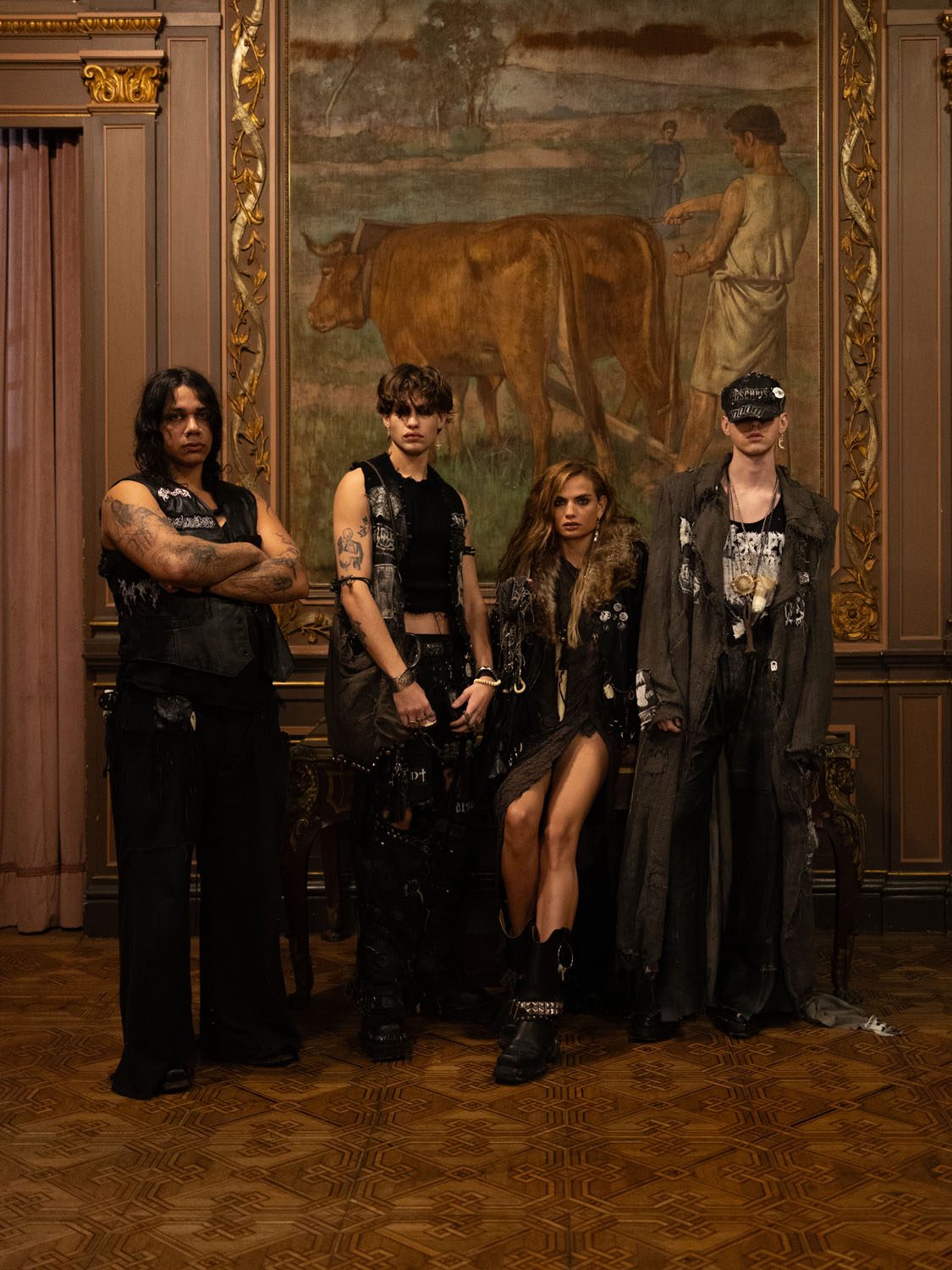
TOP LEFT
Photography – Inês Brochado
RIGHT
Photography – Luís Miguel Fonseca
LEFT
Photography – Luís Miguel Fonseca
Apollo da Costa Doria’s collection draws inspiration from the raw energy of hardcore punk and grindcore, featuring looks that mix their own lived-in, many-times-repaired garments with new items, to reflect the idea of clothing as a material record of identity, moments of inspiration and personal journey.
“Punk is a mindset. It’s raw, it’s about making noise, about taking over space just by existing in it. All my garments are based on second-hand. They have a life and I want the process and hours of handwork to be visible, like scars.”
SINI-PILVI KIILUNEN
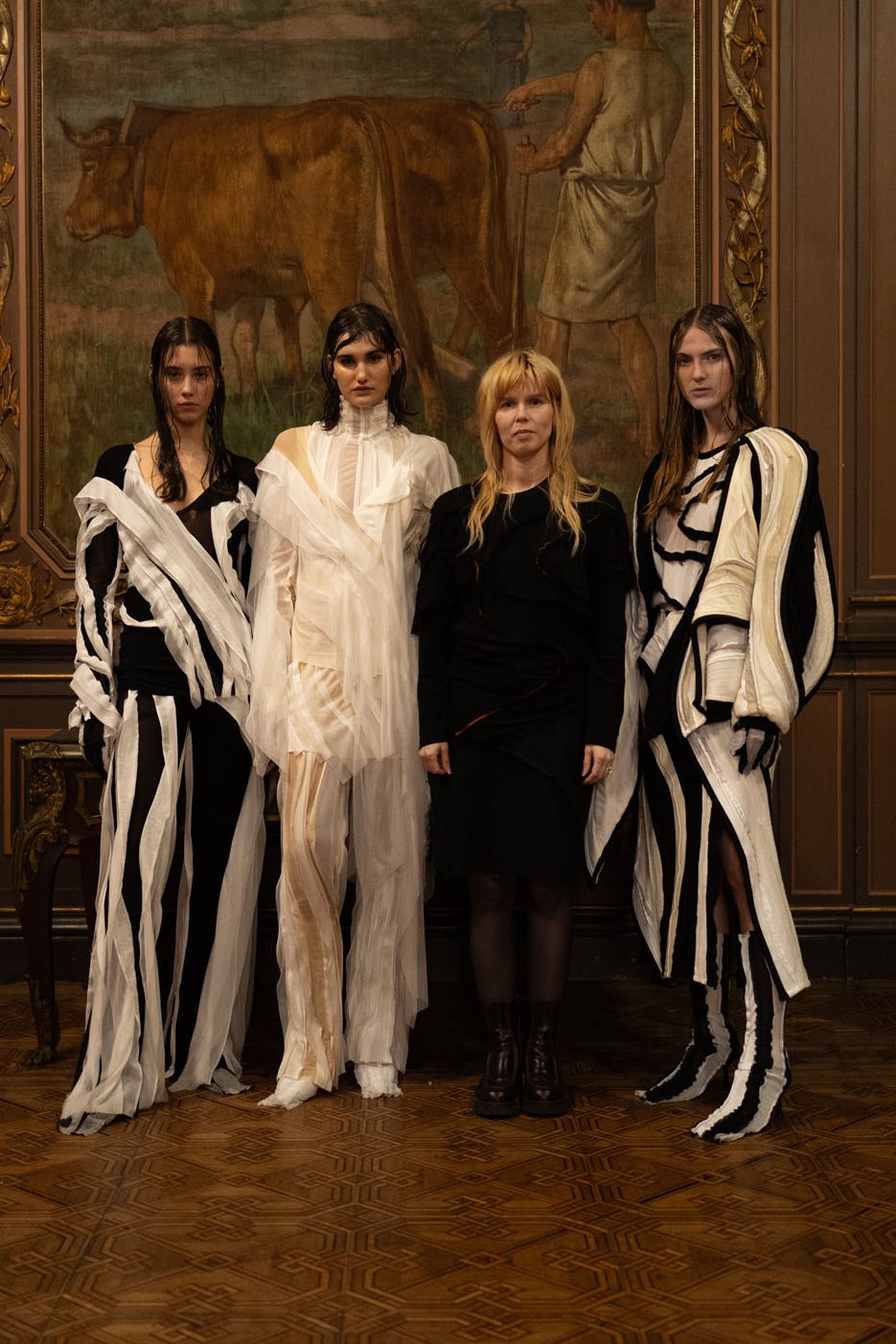
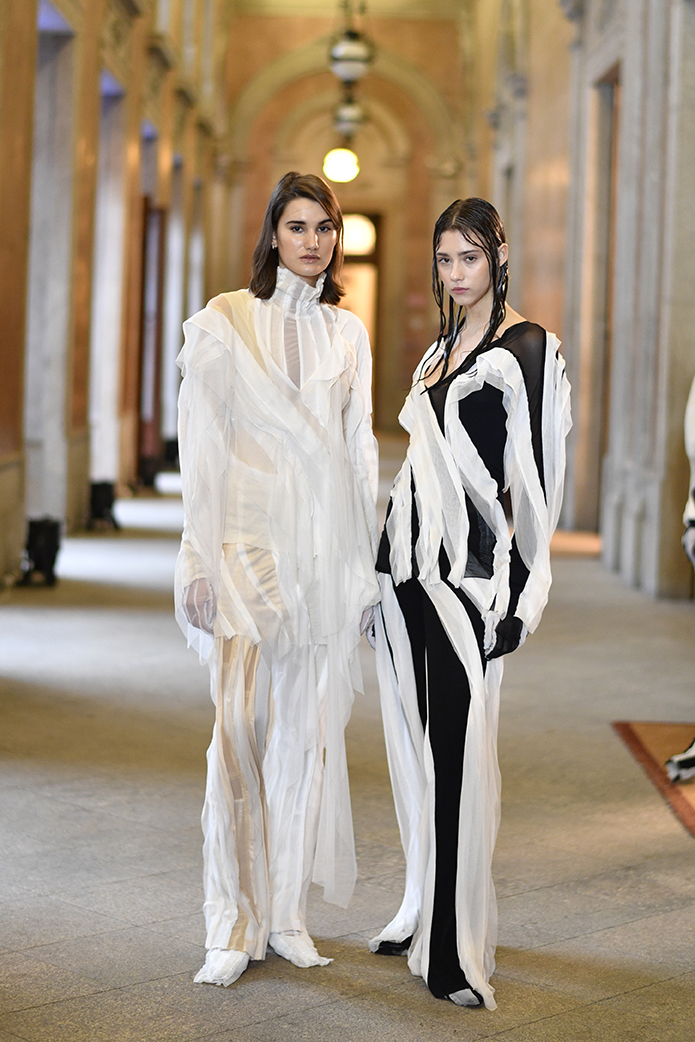
LEFT
Photography – Luís Miguel Fonseca
RIGHT
Photography – Pretonubranco
Sini-Pilvi Kiilunen‘s Curved Methodology collection employs the garment design software Clo3D as a tool for ideation, rather than its usual role as an end-stage process, to achieve complex garments constructed from fluid and curvy patterns that traditional methods could not achieve.
“I don’t take inspiration from external visuals – the making is the inspiration. The shapes that come out are very dynamic and organic. Who says clothes have to be based on block patterns?”
INSTITUT FRANÇAIS DE LA MODE, FRANCE
Jury award
CARLA MIGNANO
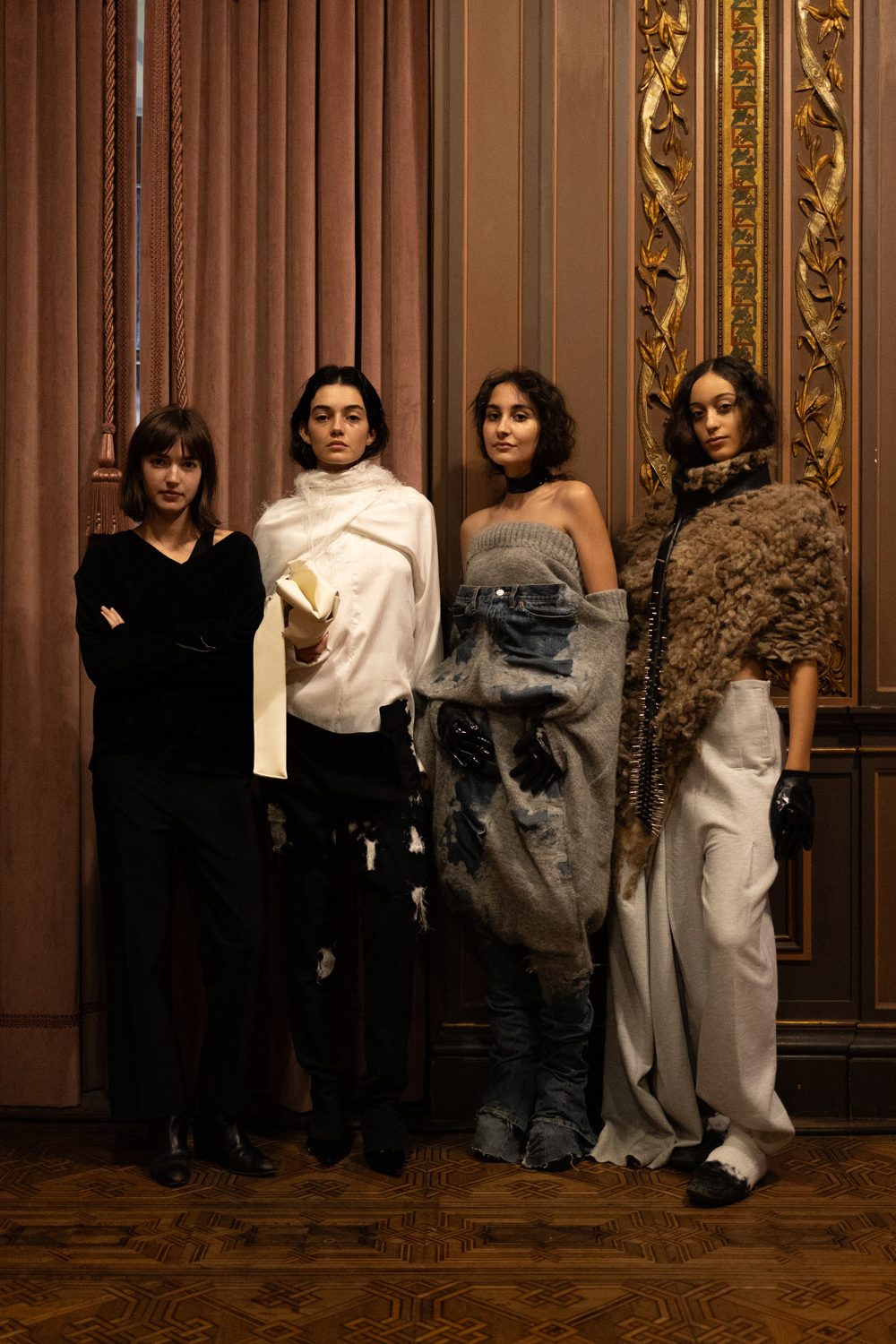

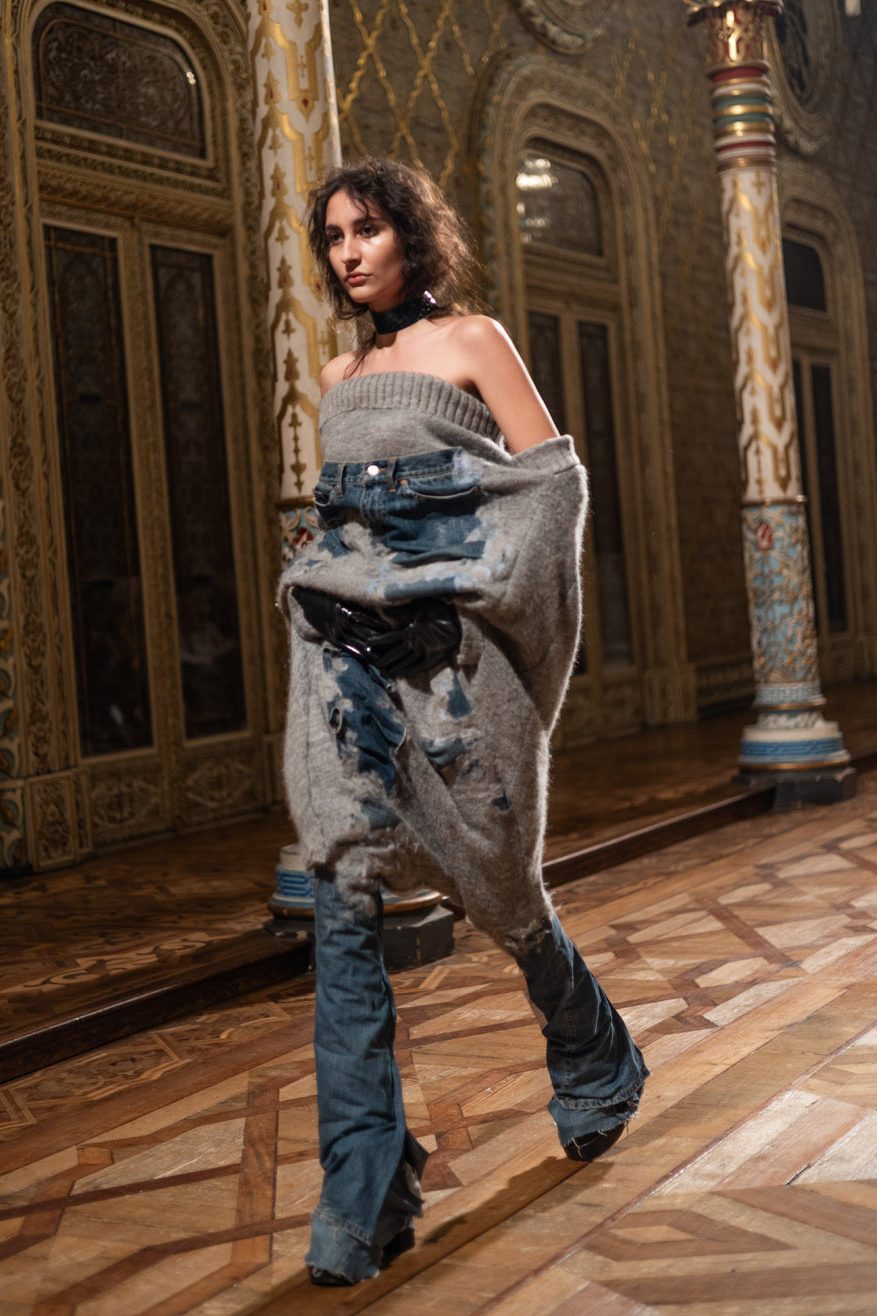
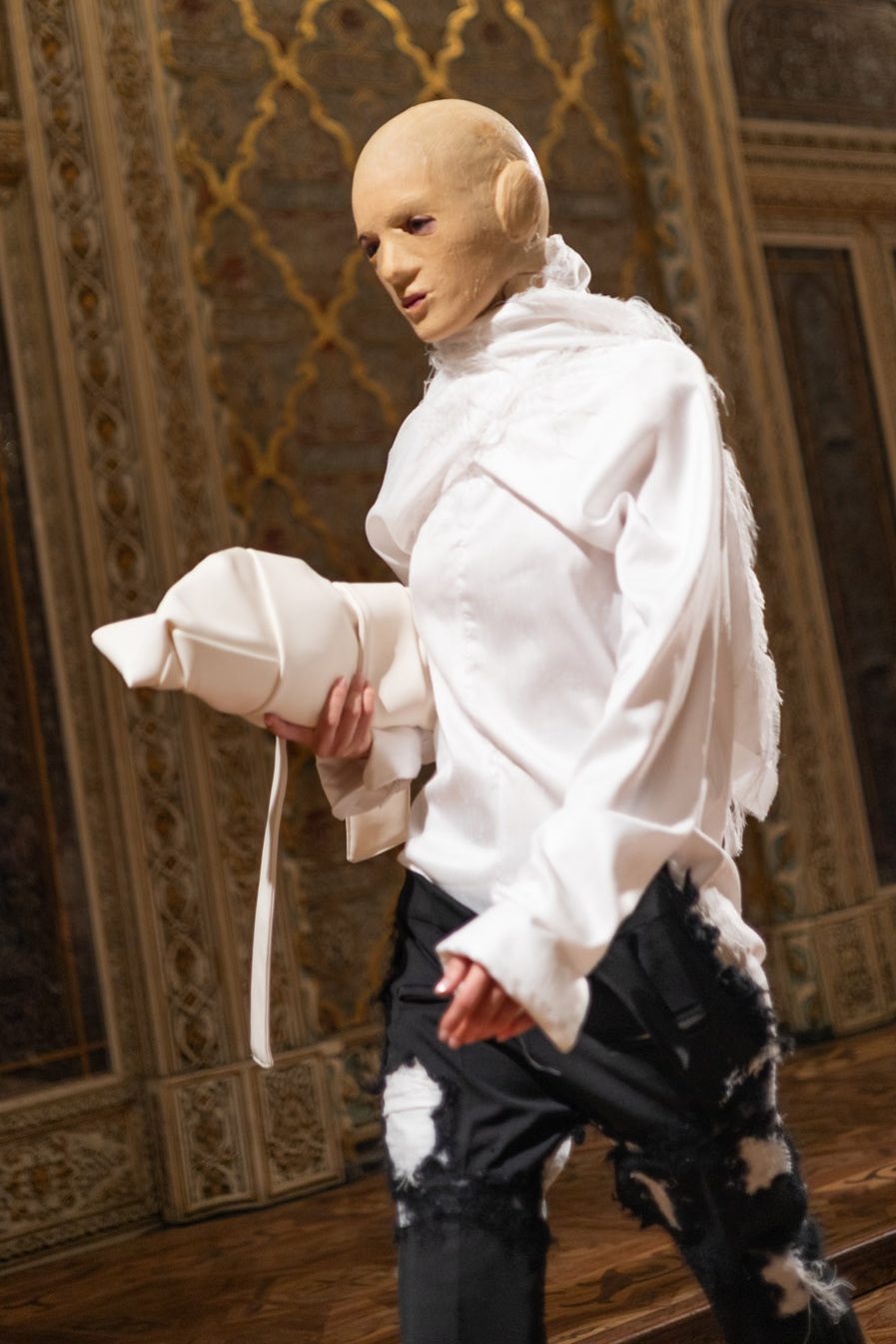
TOP LEFT
Photography – Luís Miguel Fonseca
TOP RIGHT
Photography – Pretonubranco
BOTTOM
Photography – Inês Brochado
Carla Mignano‘s Maybe If I Blink I Will Wake Up? uses the needle-punching technique to create the illusion of two garments merging into one. Aiming to evoke both beauty and discomfort, Mignano manipulates vintage items like jumpers and denims to blur the violent, uncanny and poetic nature of nightmares, dreams and memories with the real and familiar.
ANTOINE LAFLEUR

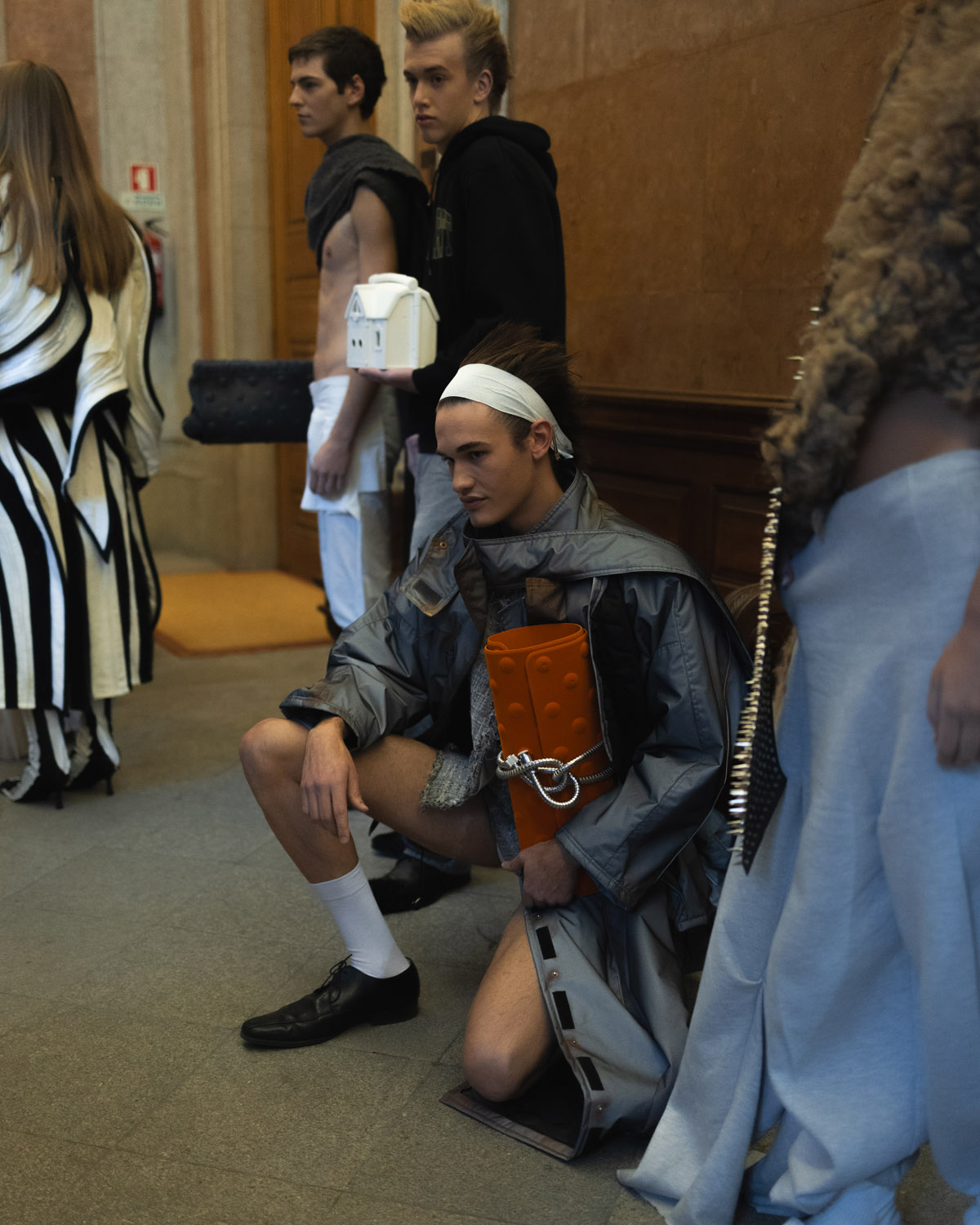
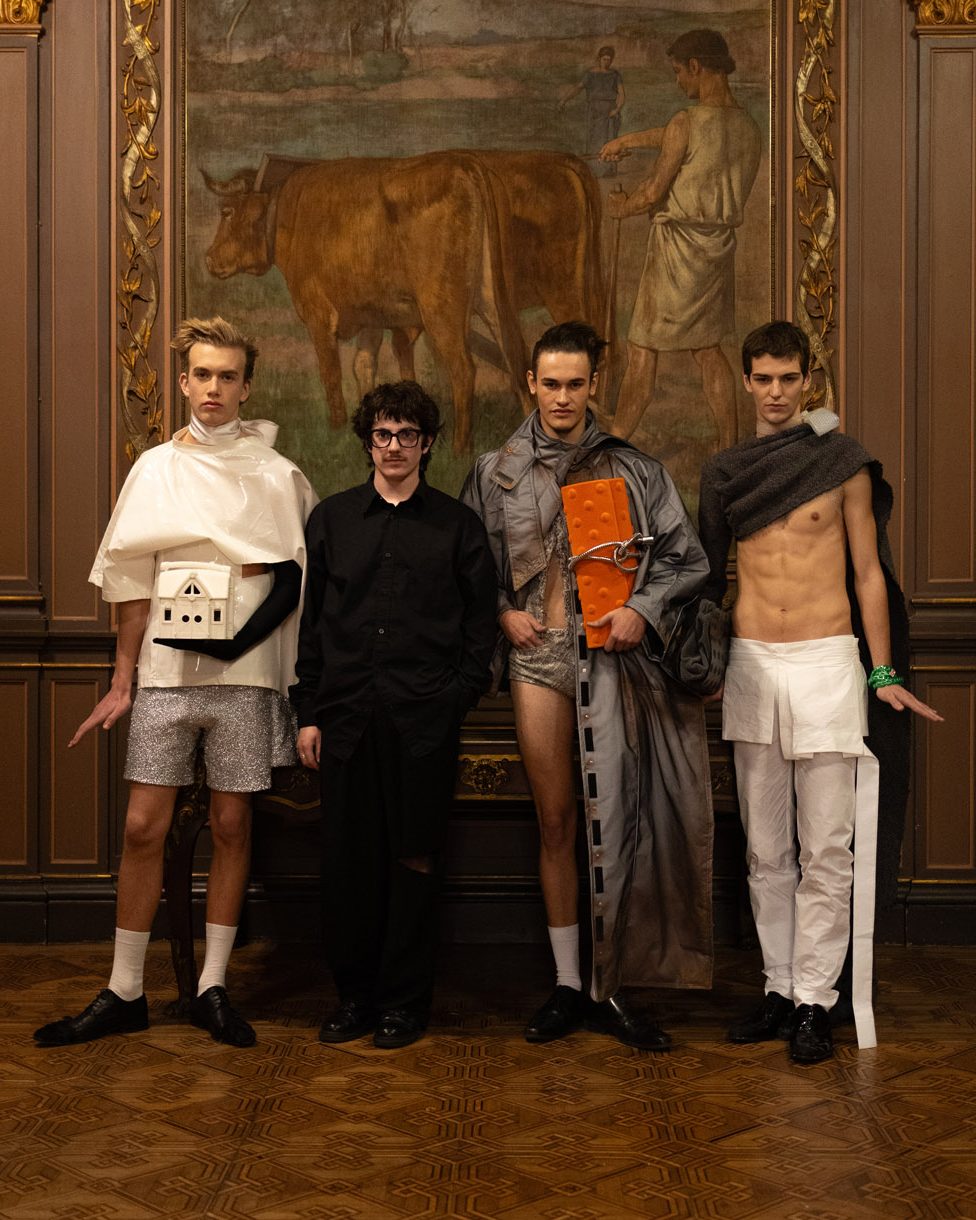
Photography – Luís Miguel Fonseca
Antoine Lafleur‘s Les Basiques de la Maison collection overlays fashion history with everyday life, using domestic items like a cake box, a dented garage door, a forgotten piece of bubble wrap, or a yellowed t-shirt, and elevating them to symbols of ‘artificial chic’ and ‘counterfeit luxury’.
CHRISTIAN YE
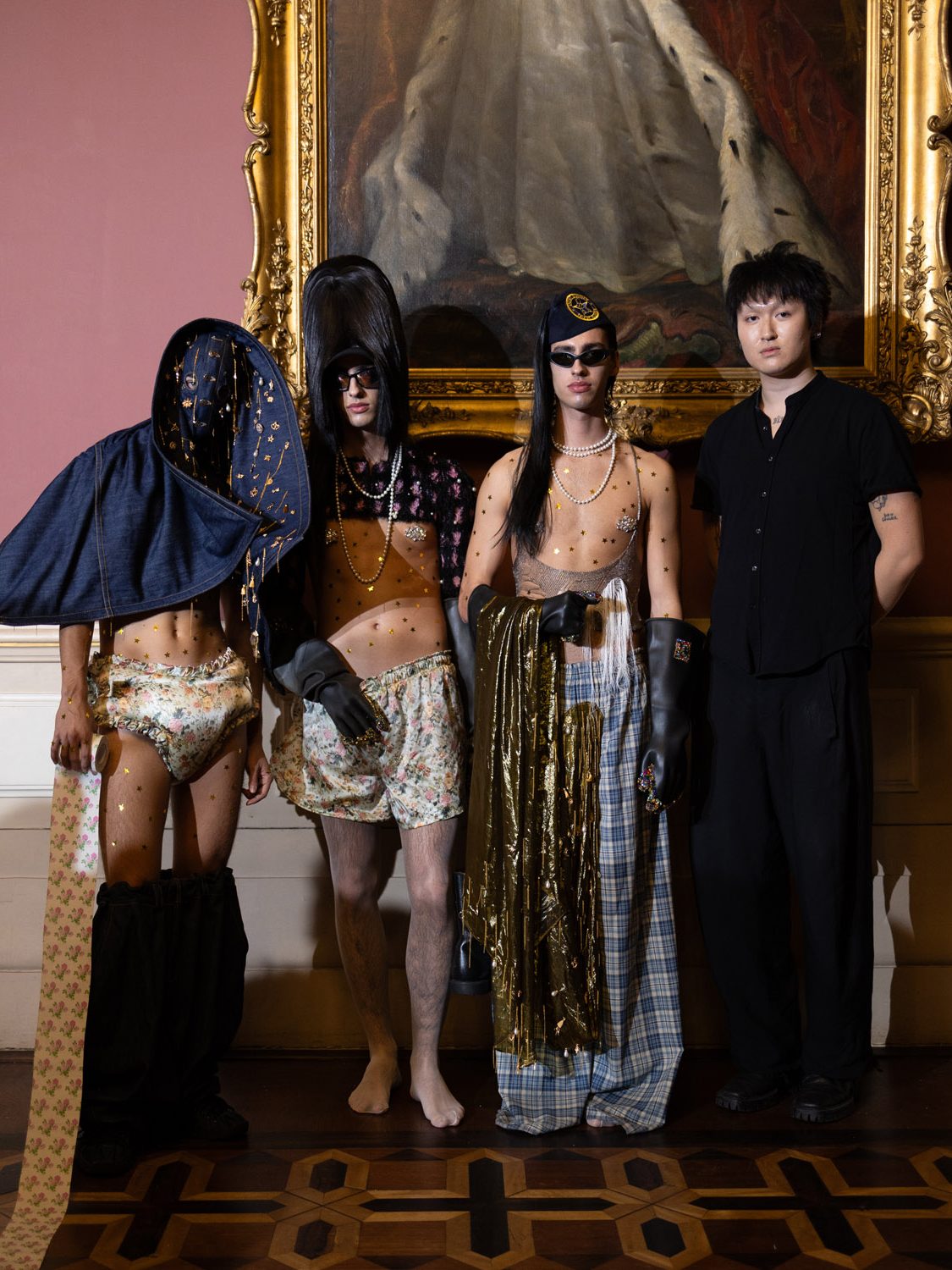
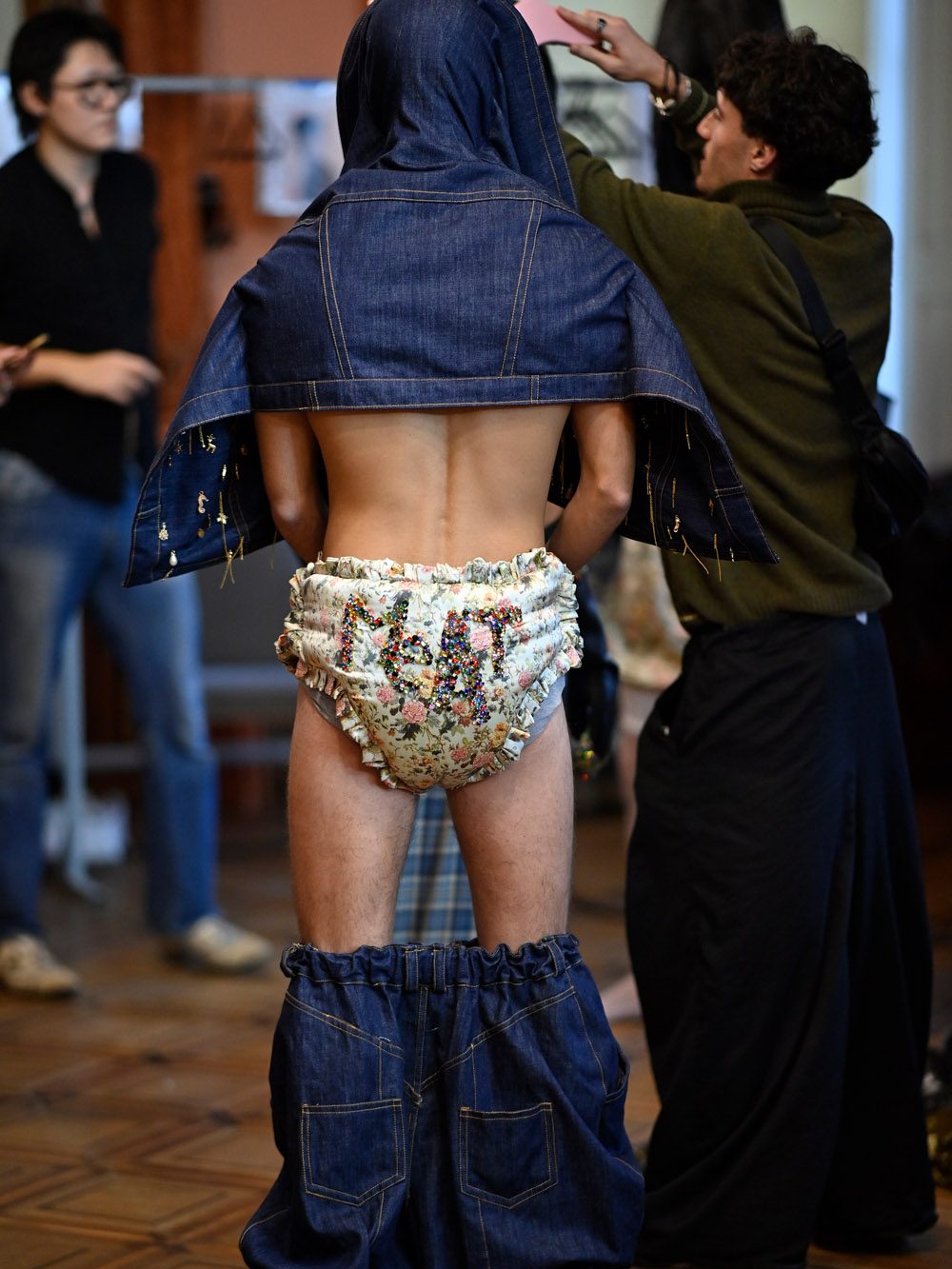
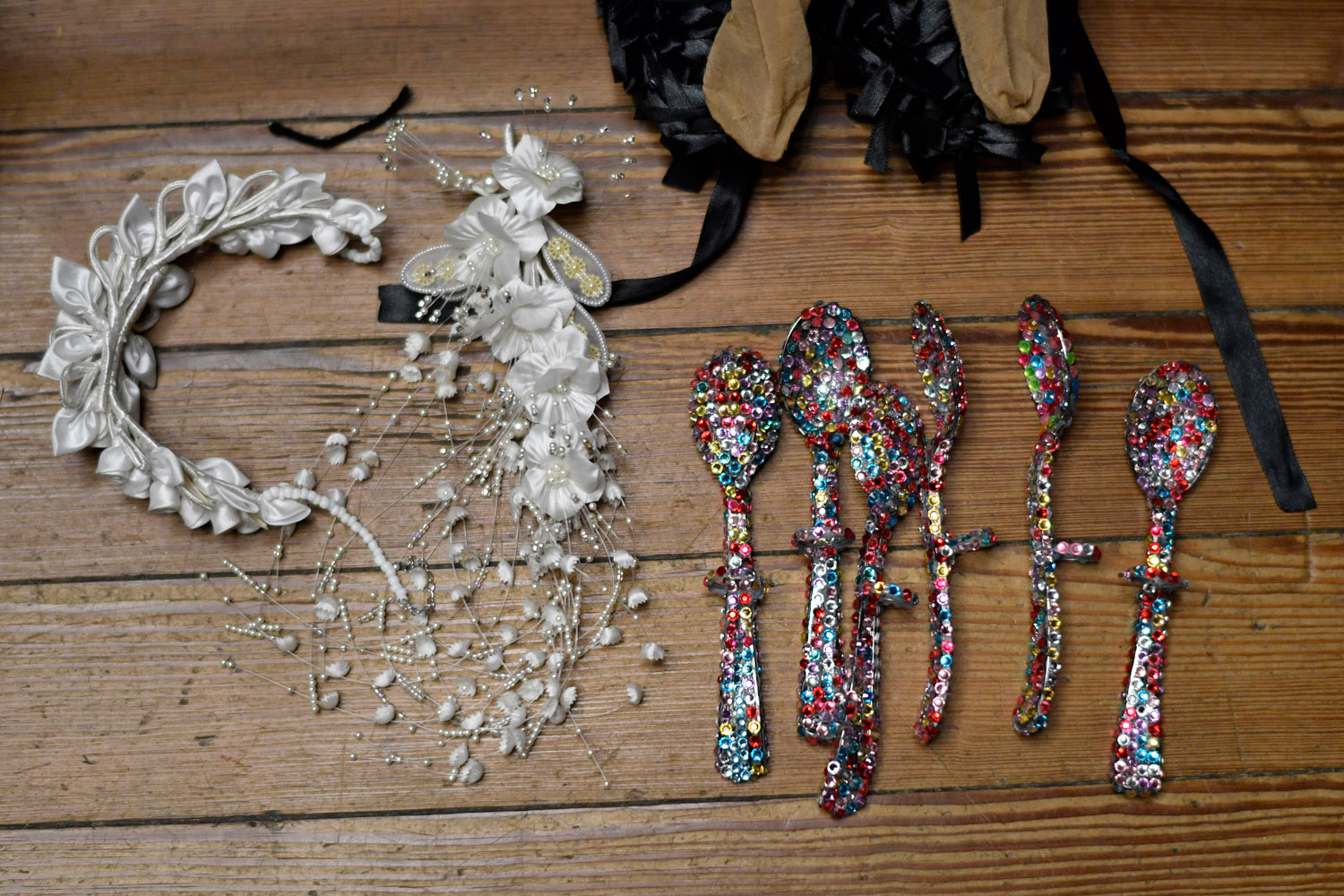
TOP LEFT
Photography – Luís Miguel Fonseca
Photography – Pretonubranco
Christian Ye‘s Dust Bunny collection is a tribute to the queer community of Paris whose support gave him the courage to come out, with aspects in each look inspired by real-life personalities. Ye also draws on his Chinese and Hungarian heritage, blending nostalgic childhood references with elements of street- and clubwear.
“The idea is based on eight different silhouettes standing in line at the rave. The energy of a night out in Paris is really free.”
POLIMODA, ITALY
Jury award
IAN MCDONALD
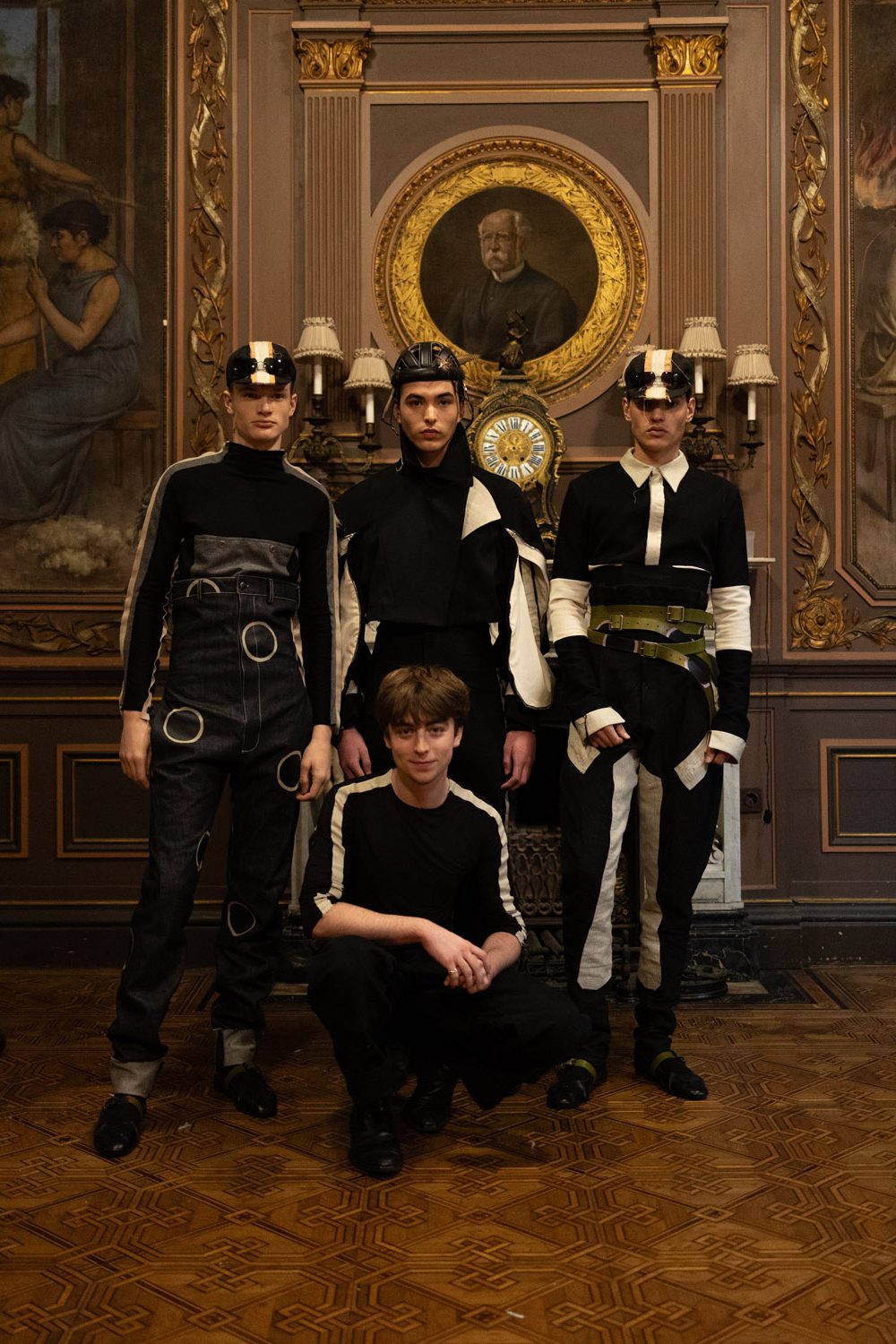
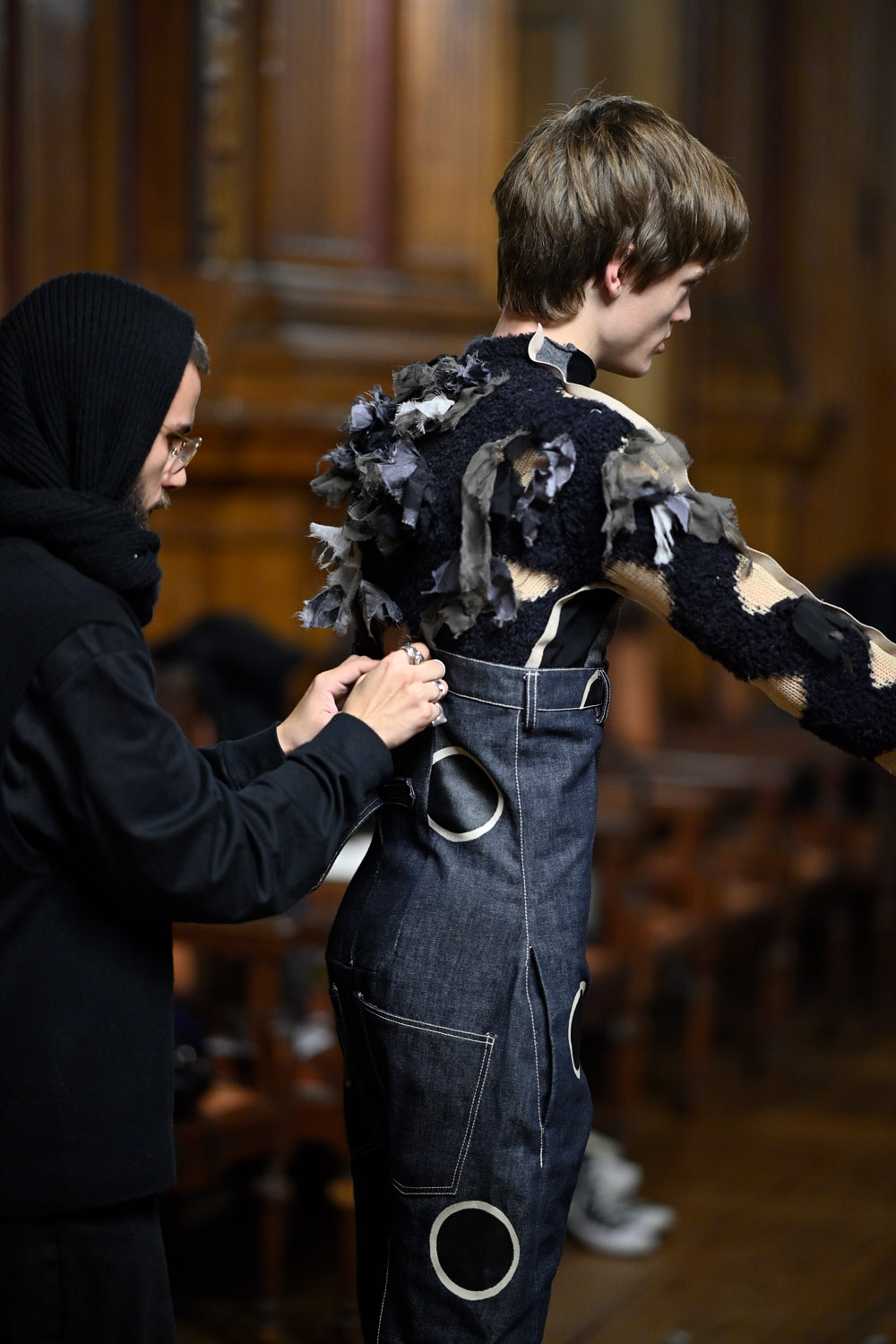
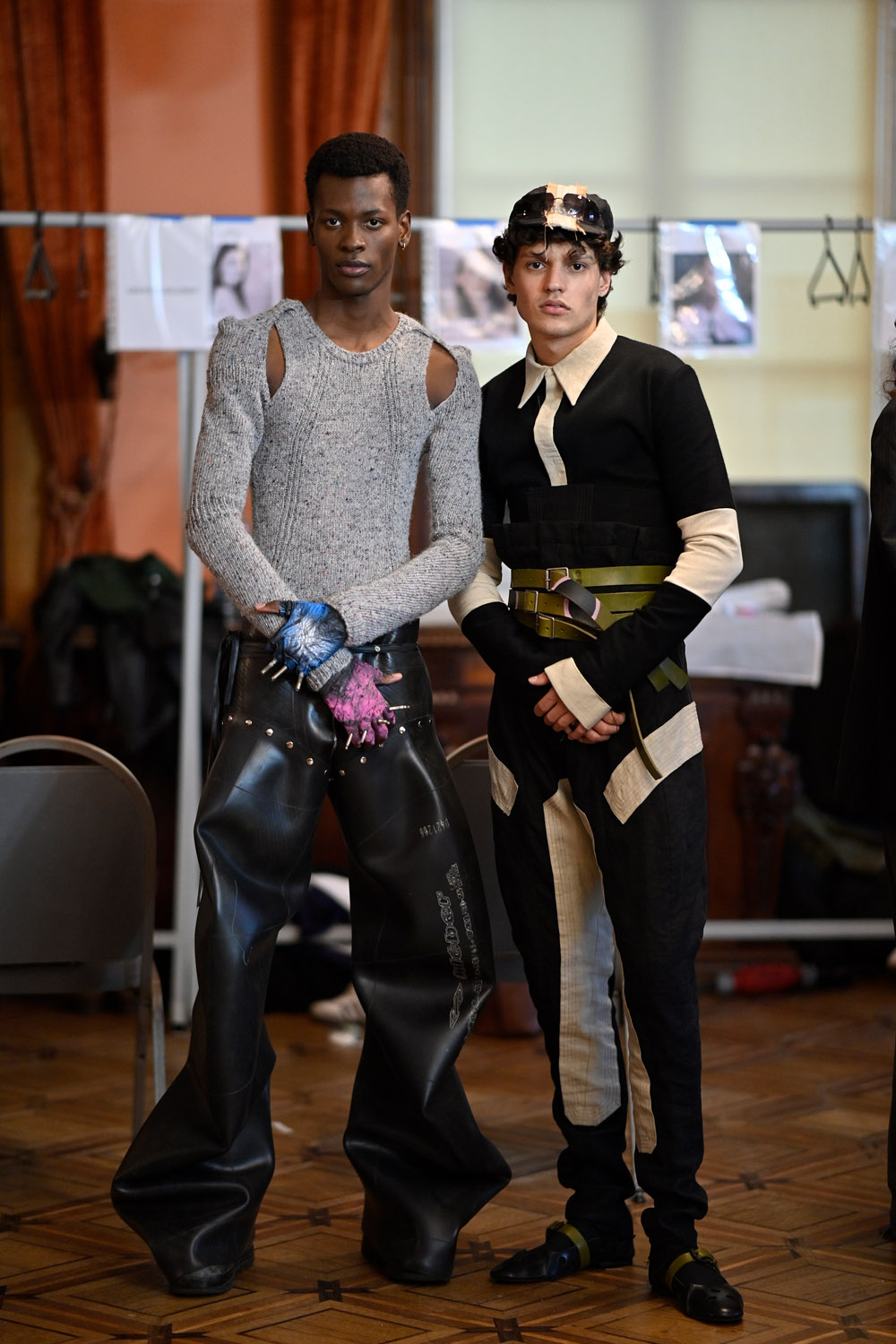
TOP LEFT
Photography – Luís Miguel Fonseca
Photography – Pretonubranco
Ian McDonald takes inspiration from the vintage kits and movements of cyclists, employing shapes that mimic the dynamic between open and closed body positions. With references to the physical demands of mountain terrain and the emotional resilience required to navigate it, his collection symbolises the professional pursuit of the finish line.
“I used to race bikes back in Colorado and I used that as a reference. Instead of technical synthetics, this collection uses natural fibre fabrics like cotton, wool and linen, with prints inspired by Tour de France like jacquard and polka dot.”
GABRIELA BLAKE
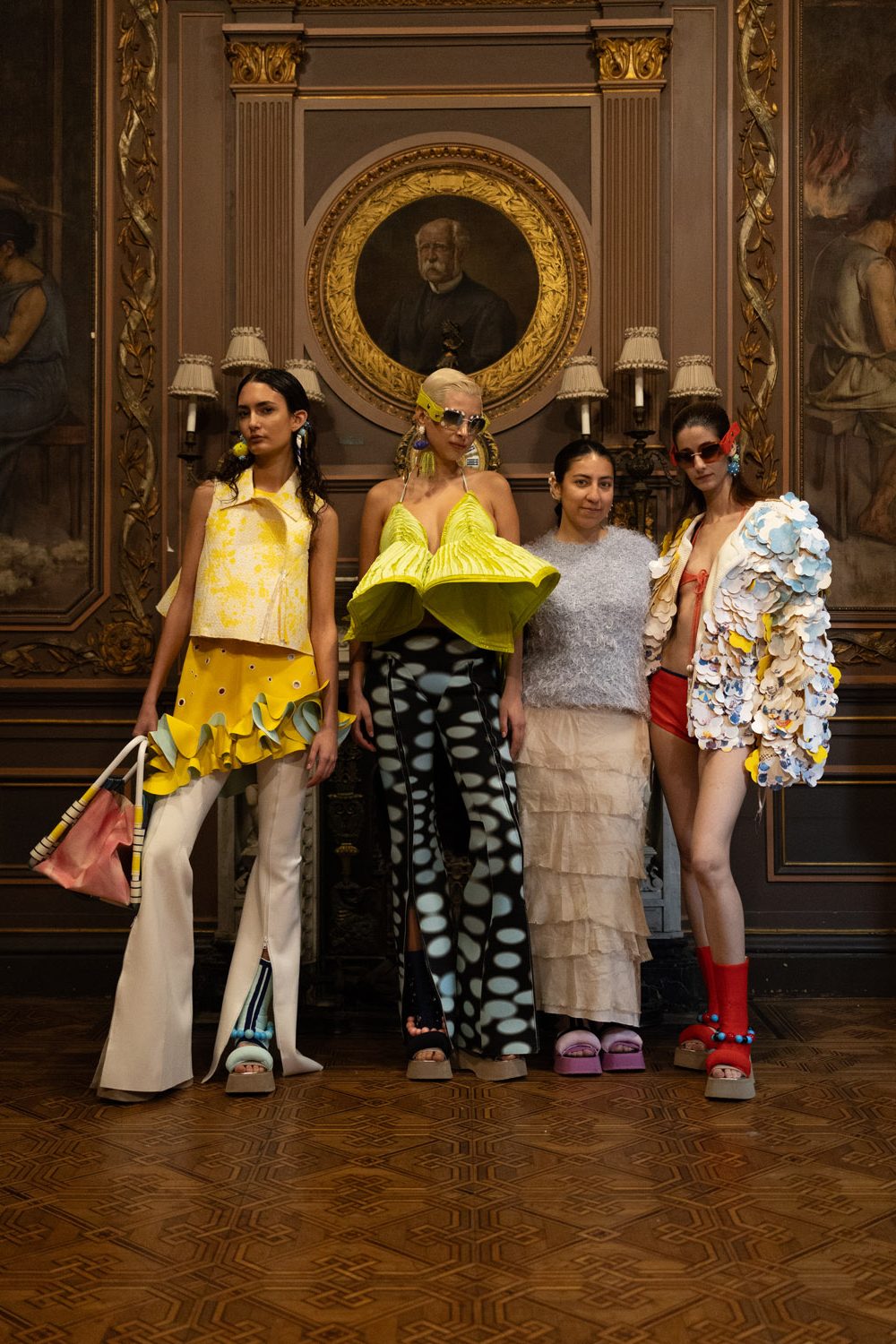
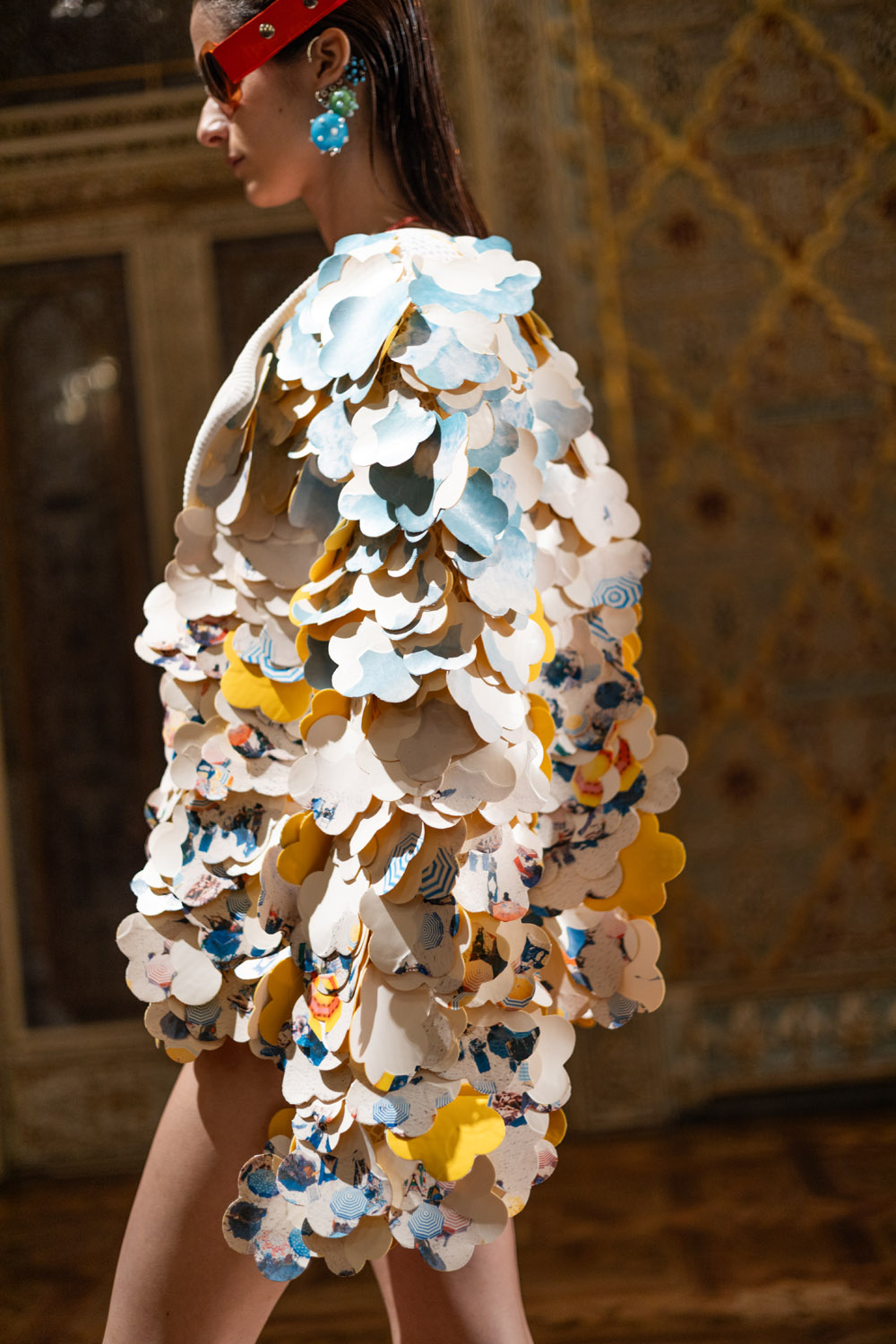
LEFT
Photography – Luís Miguel Fonseca
RIGHT
Photography – Inês Brochado
Gabriela Blake‘s playful Bá-Rè collection explores her own cultural identity as an American raised in Manaus, Brazil. Reimagining technical materials like neoprene in bright, textured garments, Blake evokes the carefree nostalgia of beach holidays, aiming to critique the stereotype of Americans dressing inappropriately abroad, and makes fashion a space for cultural reflection.
“One of the most important design elements for me is irony.”
JIMENA GUZMAN
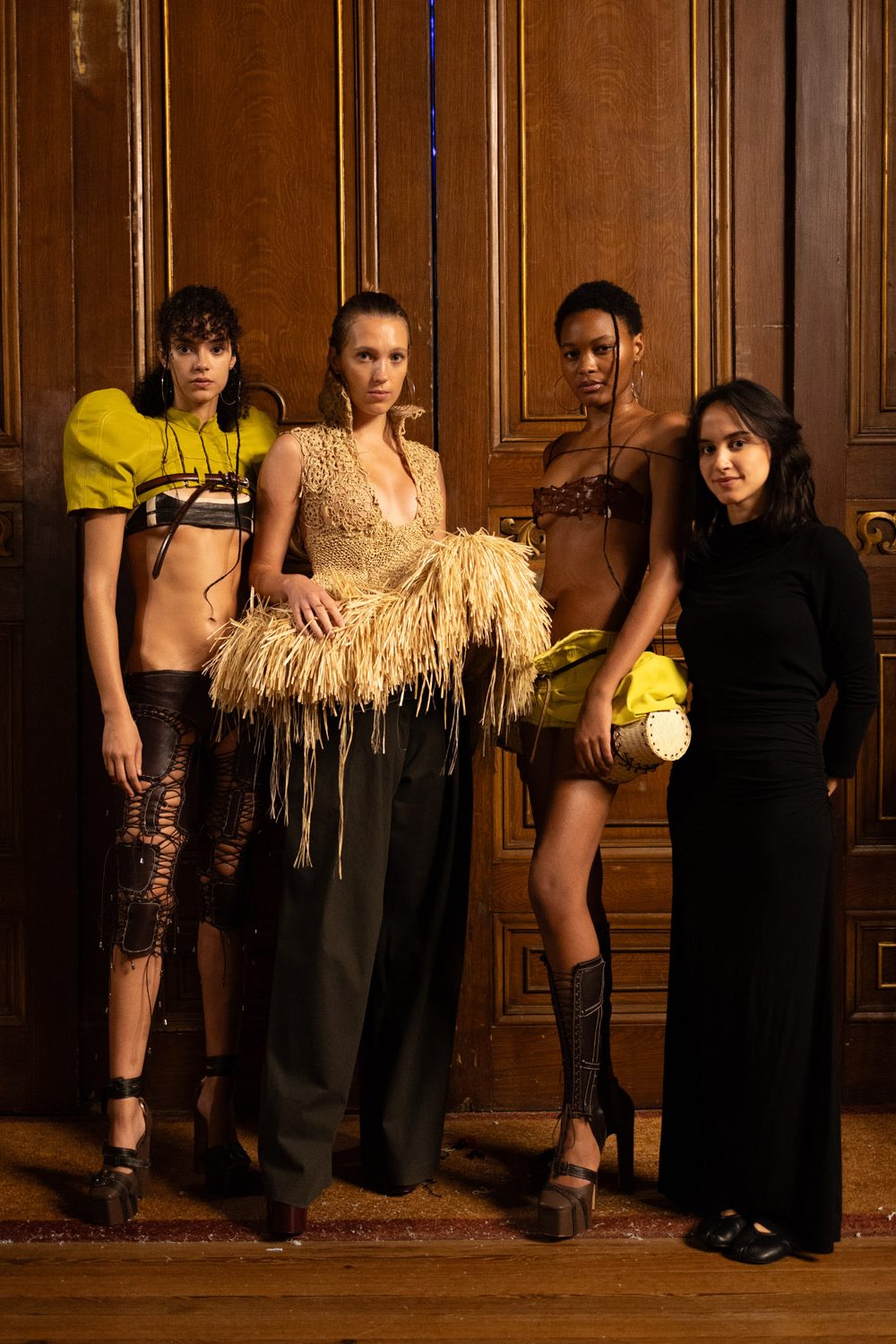
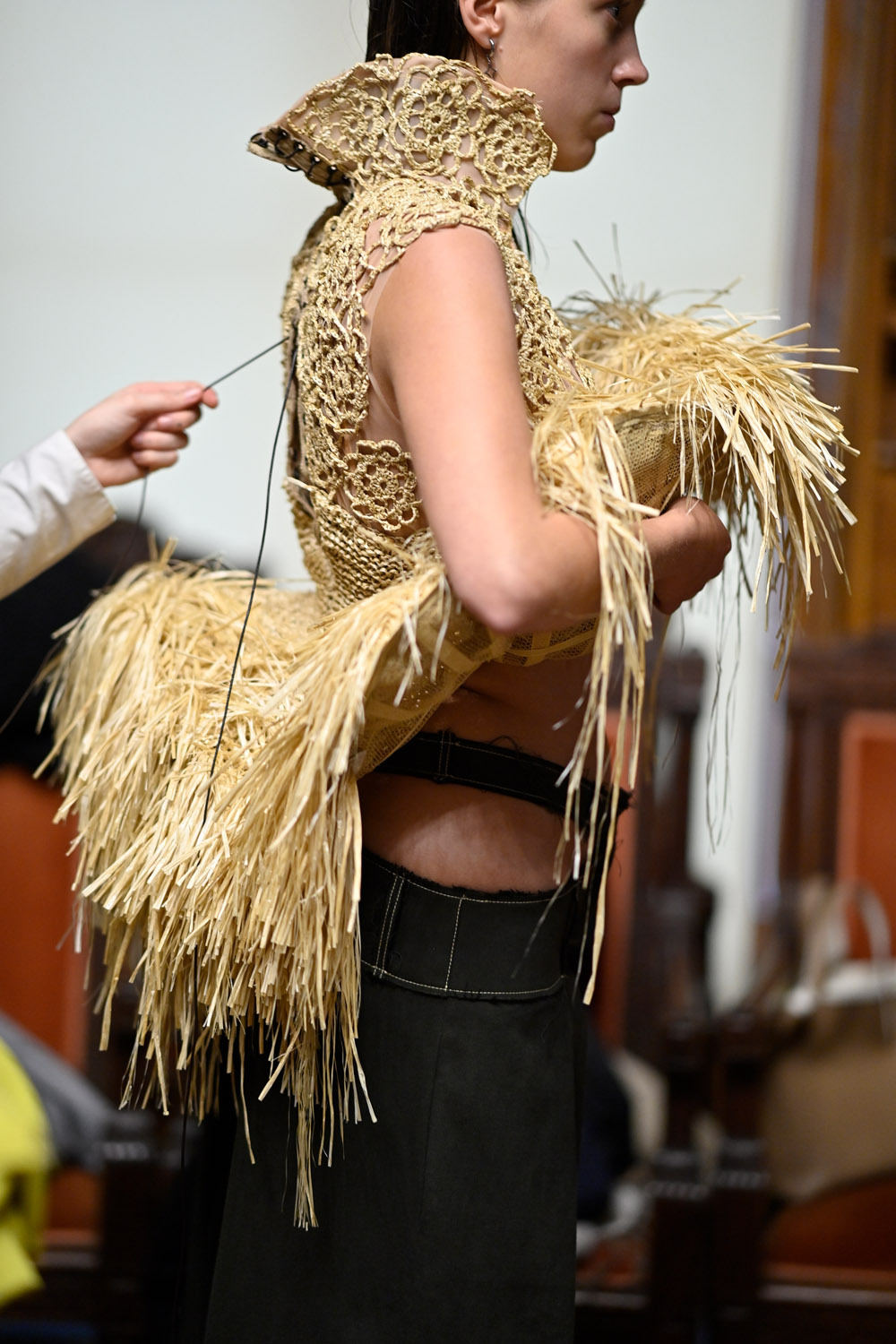
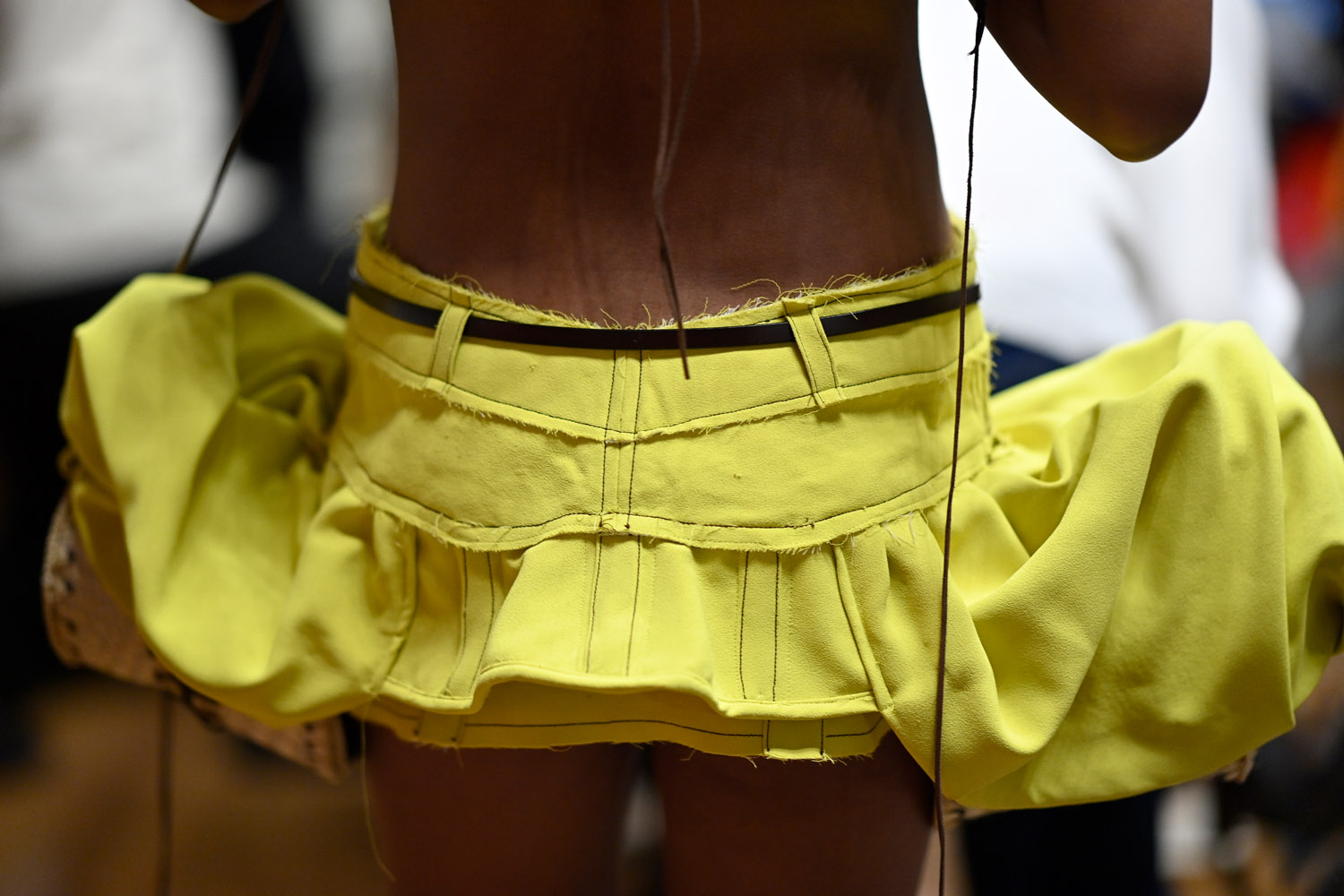
TOP LEFT
Photography – Luís Miguel Fonseca
Photography – Pretonubranco
Jimena Guzman‘s BAJO MUND() celebrates the resilience and spirit of the Dominican people, particularly those from marginalized urban neighbourhoods, by fusing local crafts like weaving and wirework with contemporary aesthetics. Guzman’s work challenges the notion that art is only for the privileged, demonstrating how imagination can flourish with limited resources.
@jmna_gzmn
LONDON COLLEGE OF FASHION, UNITED KINGDOM
Jury award
EDEN SHERRY
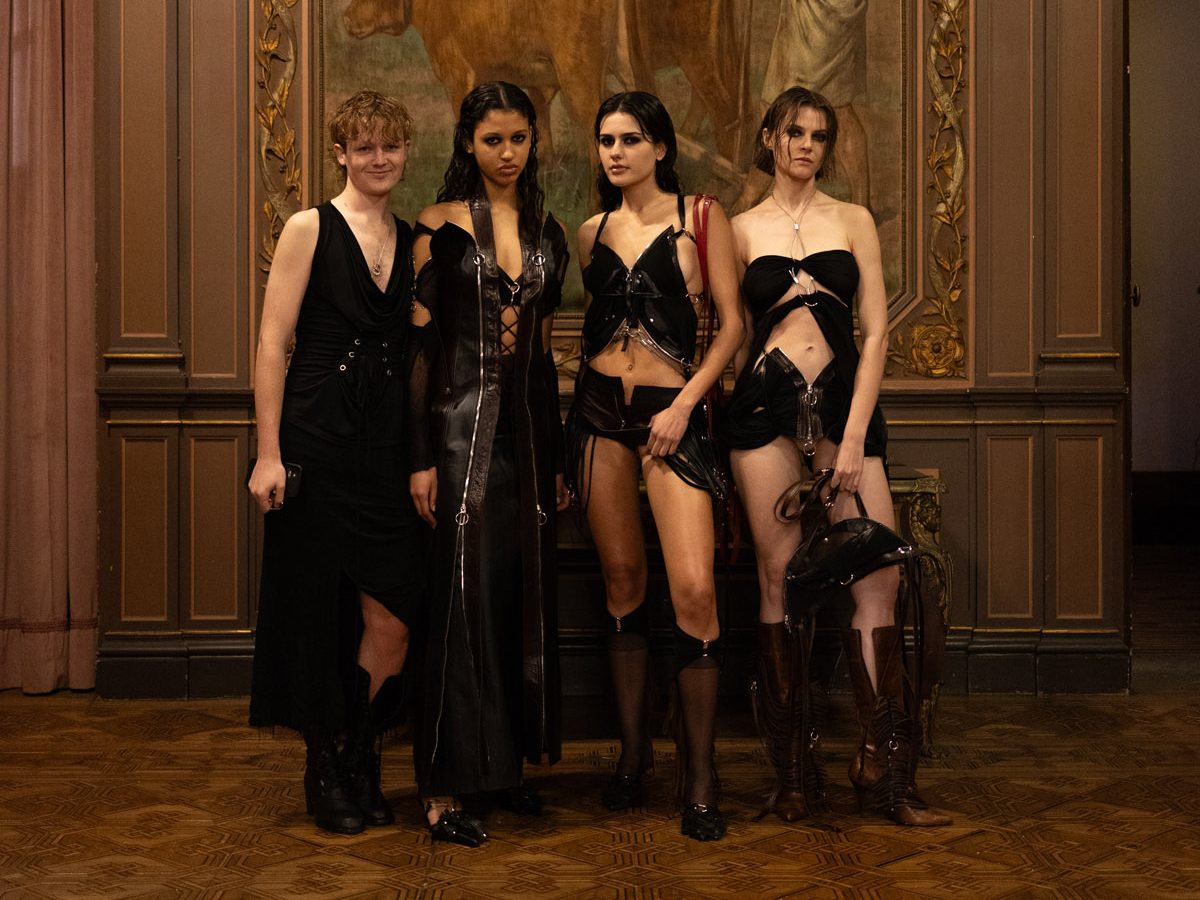
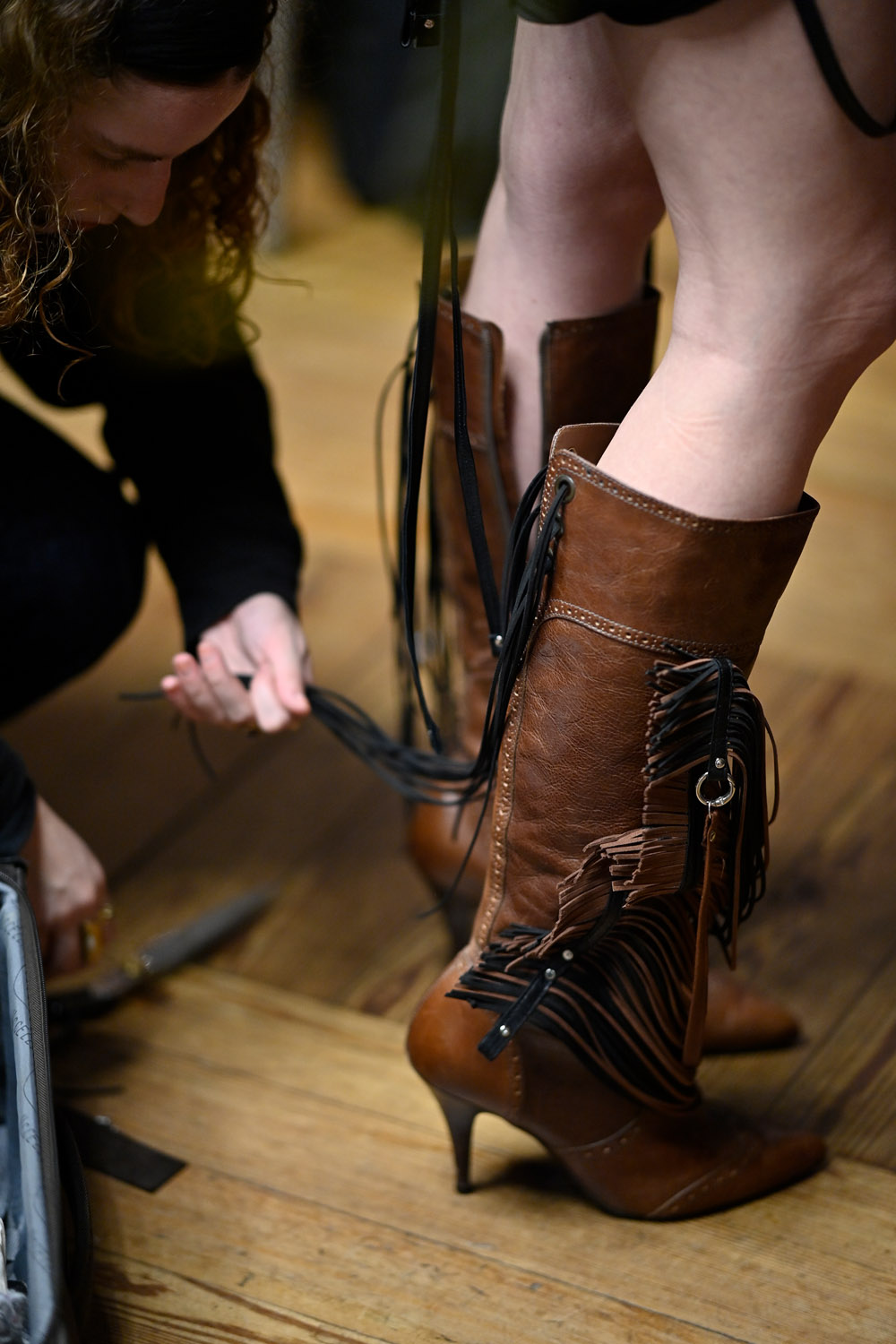
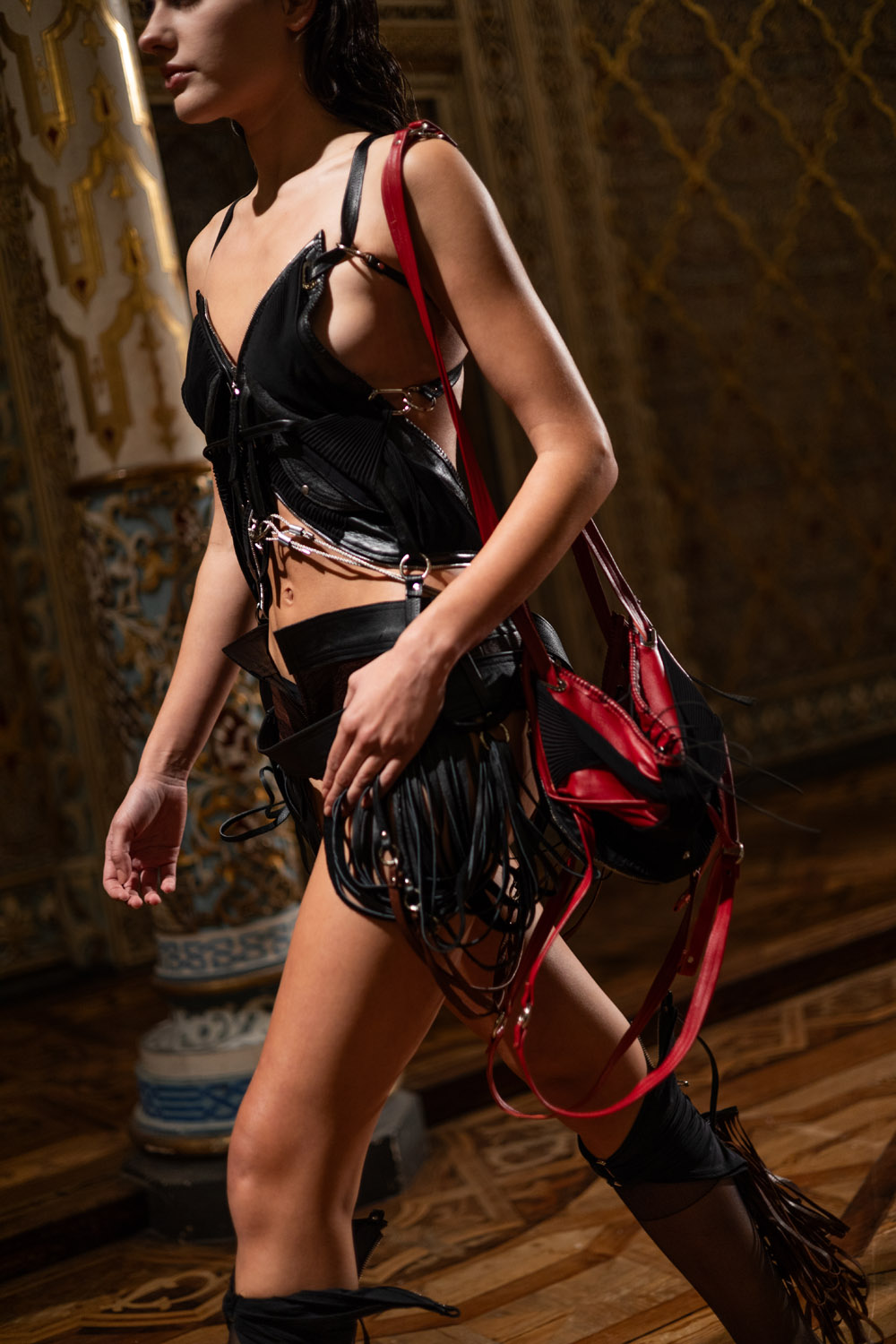
TOP
Photography – Luís Miguel Fonseca
LEFT
Photography – Pretonubranco
RIGHT
Photography – Inês Brochado
Eden Sherry‘s modular leather- and jersey-based collection features twistable pleated fabrics and YKK zippers to create multifunctional and personalizable garments. Emphasizing comfort, and inspired by memories and moments shared with friends, the pieces exude a playful and impulsive mood while promoting longevity in fashion.
“These garments are about how it’s fun to wear things differently, and how people change what they’re wearing throughout the day. It’s fun, camp and functional.”
KRISTINE DZENE
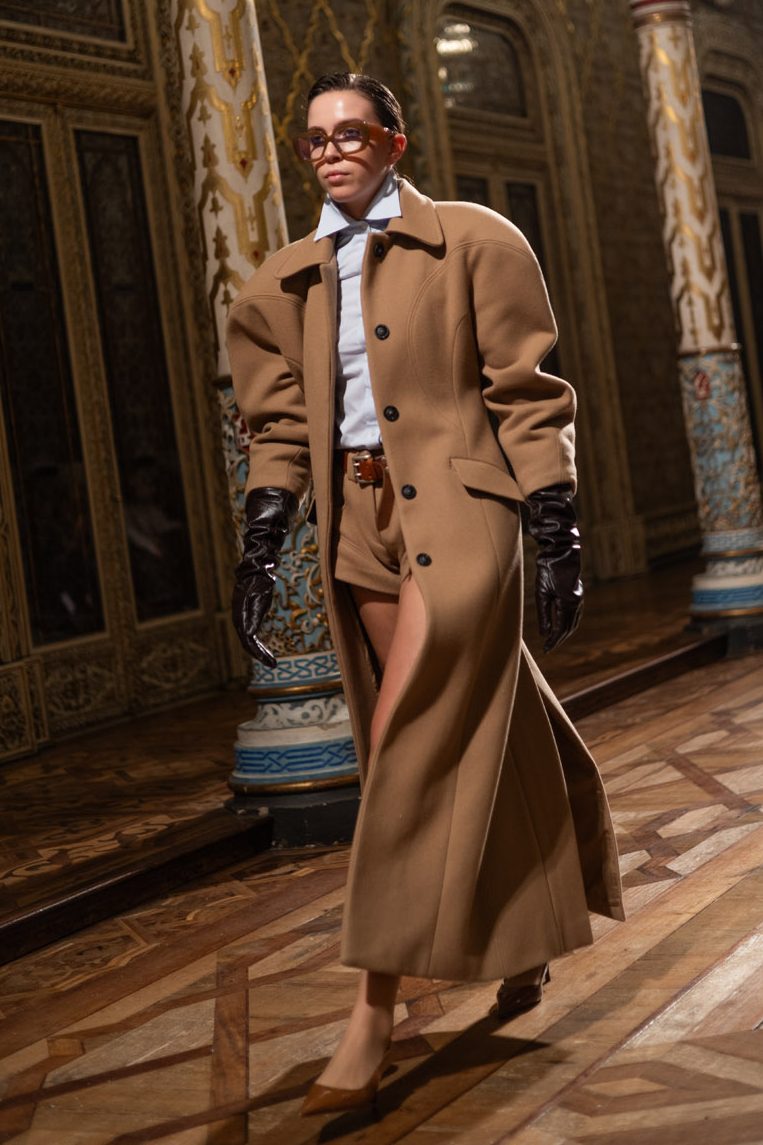
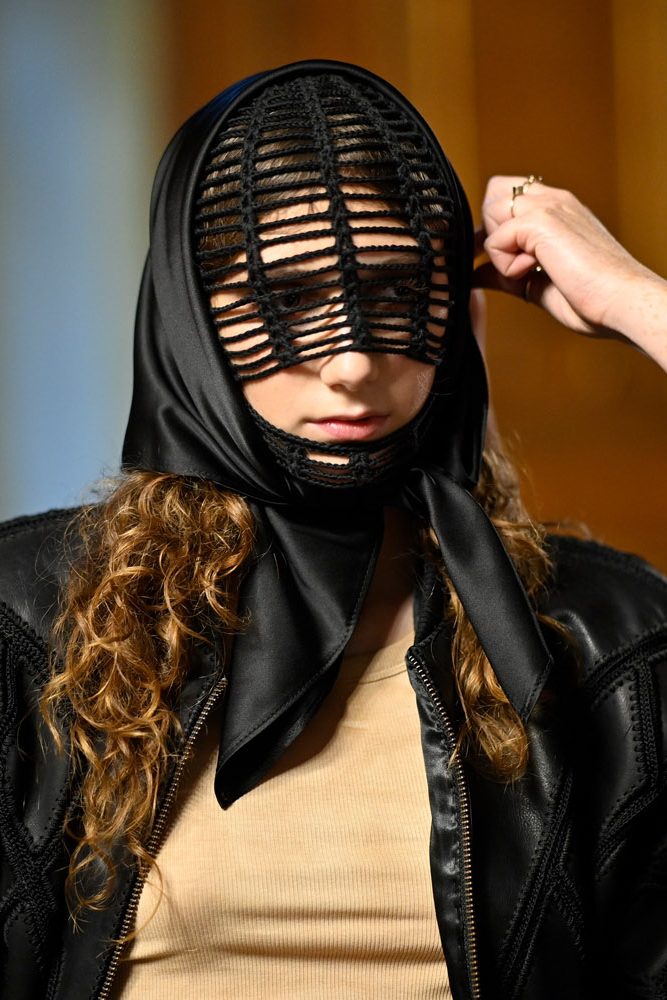
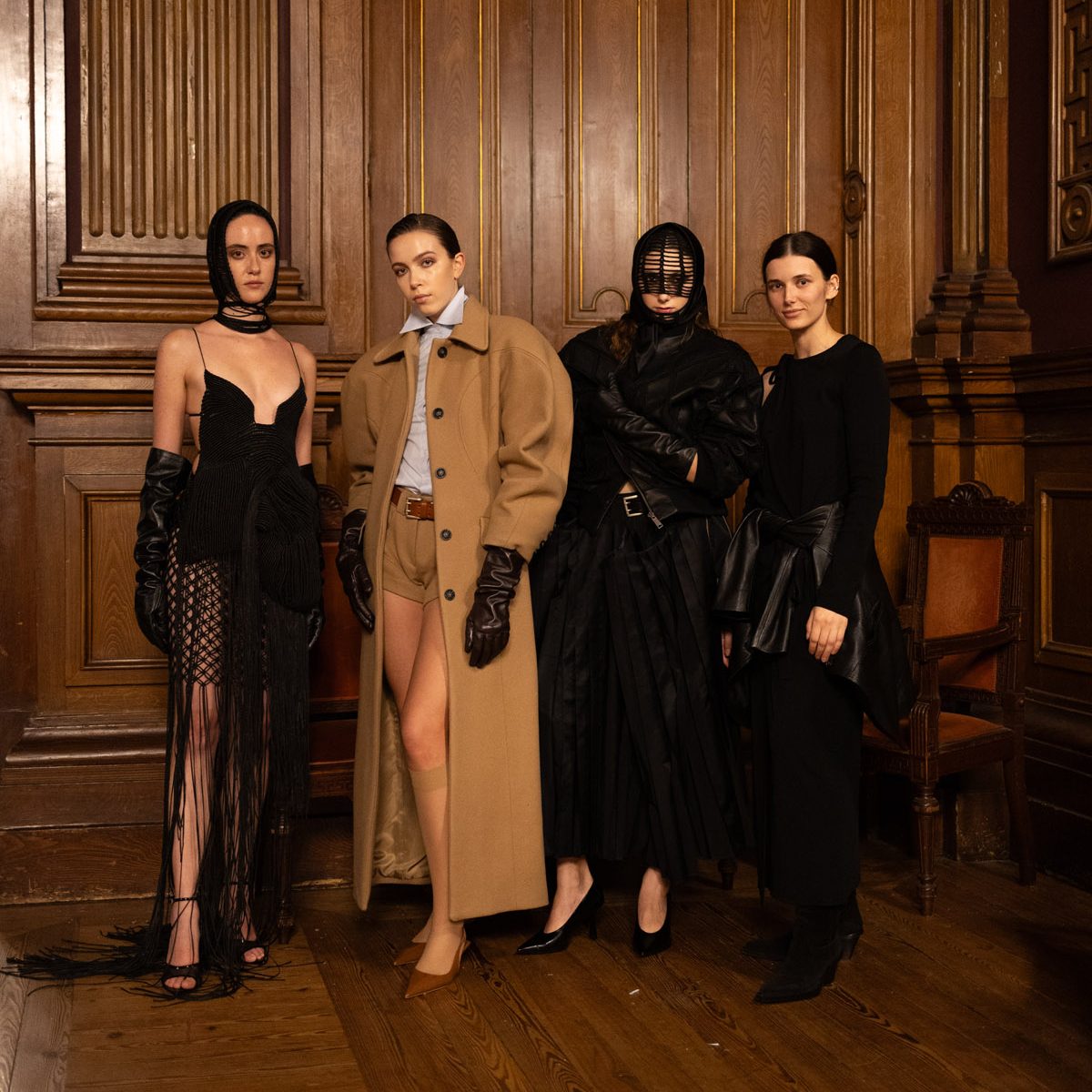
TOP LEFT
Photography – Inês Brochado
RIGHT
Photography – Pretonubranco
BOTTOM
Photography – Luís Miguel Fonseca
Kristine Dzene‘s Reverie is deeply rooted in childhood memories and the influence of her grandmother, who introduced her to sewing and craftsmanship during their summers in the countryside. Taking its style cue from her grandmother’s role as a volleyball captain, Dzene’s collection gives heritage sportswear shapes and colours a contemporary spin.
“I was inspired by my grandmother’s wardrobe and her attitude of keeping and caring for garments. For my collection, I prepared the samples and travelled back to Latvia to work on them with her. It was very special.”
SCOUT MACPHERSON
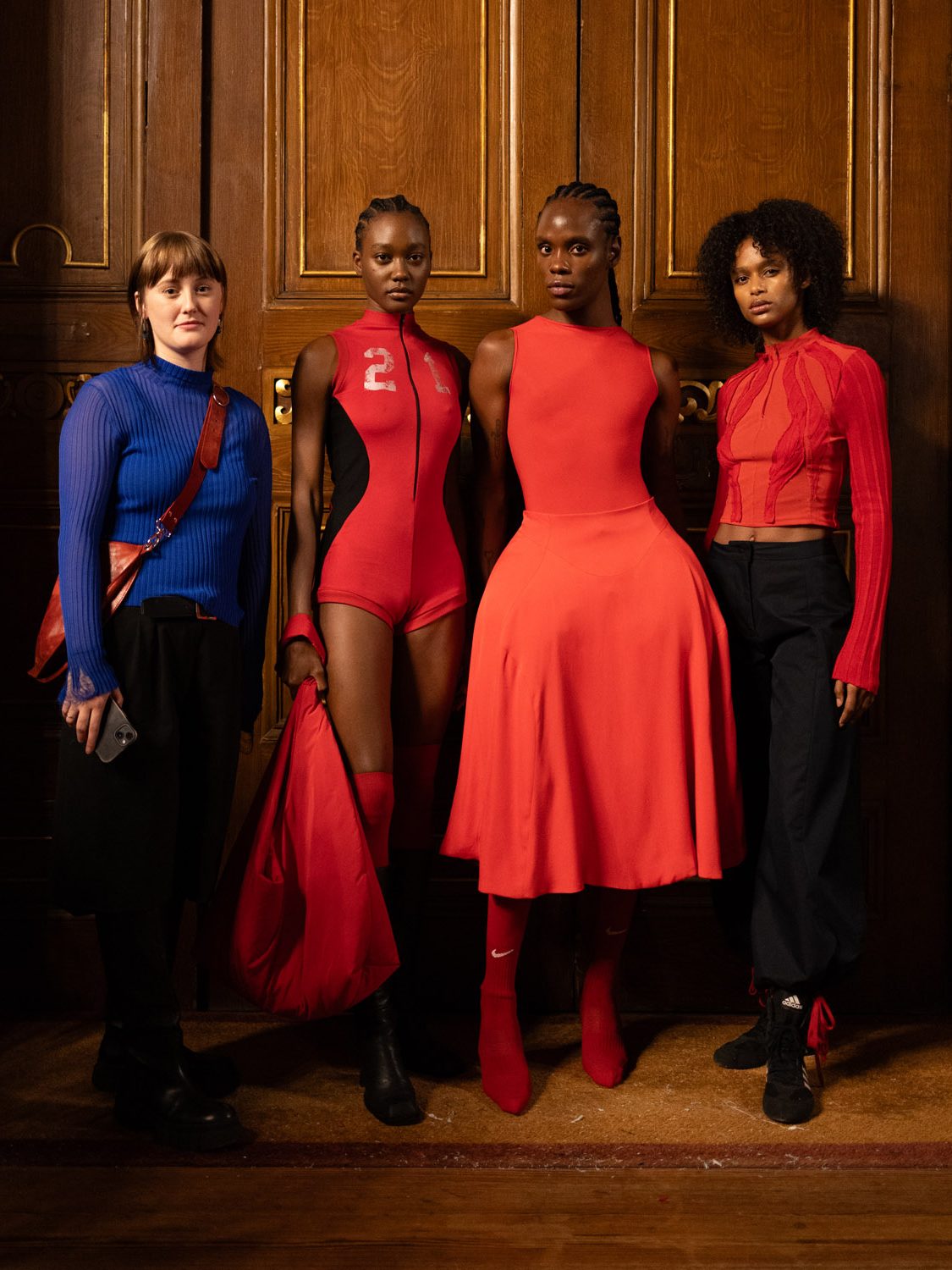
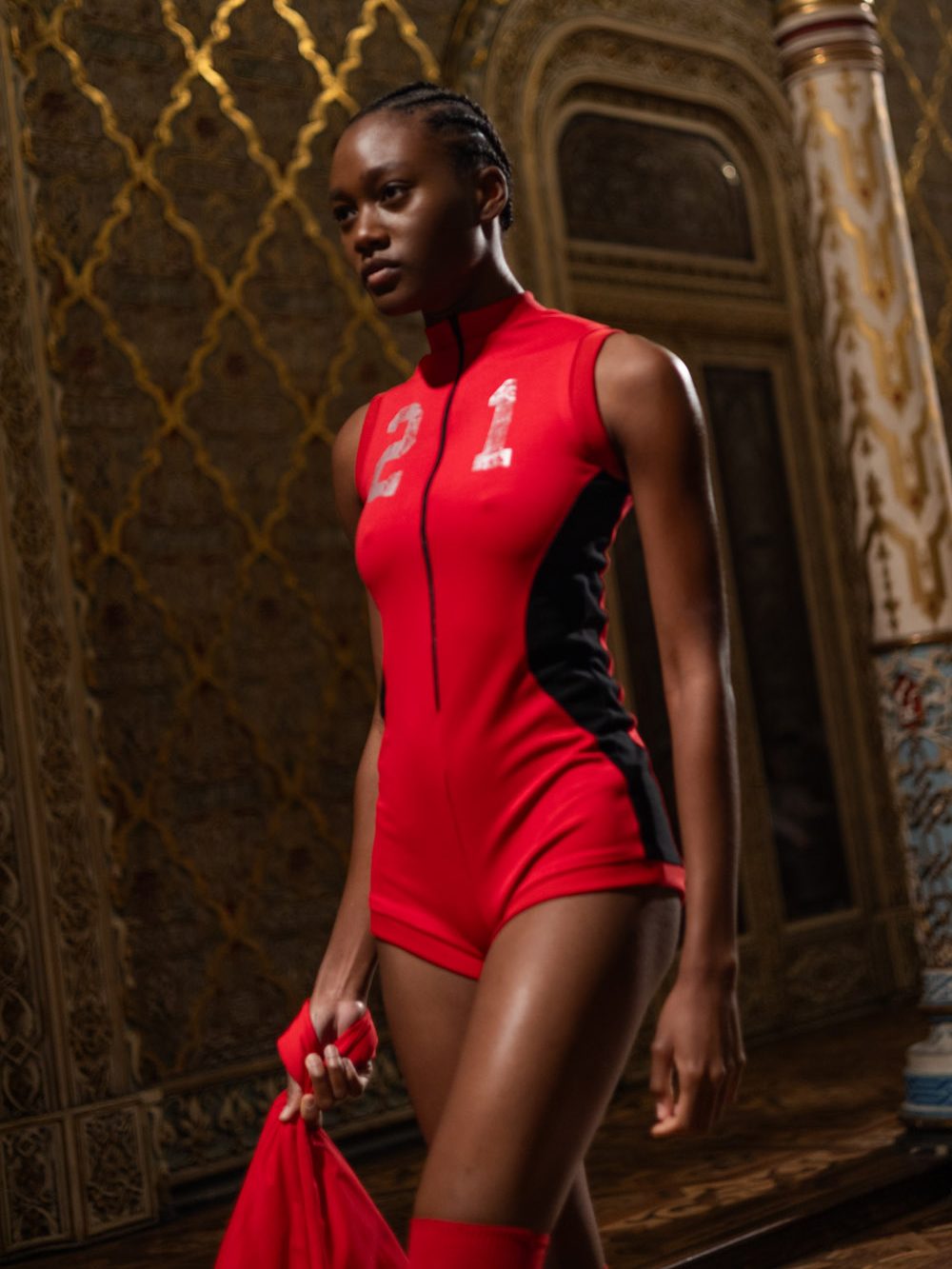
LEFT
Photography – Luís Miguel Fonseca
RIGHT
Photography – Inês Brochado
Scout Macpherson’s Hematoma collection is inspired by Takotsubo Syndrome, or ‘Heartbreak Syndrome’, caused by intense emotional stress. Drawing from the non-linear nature of heartbreak, Macpherson uses voluminous, hand-sewn sculpted padding to symbolize the ballooning heart, while sportswear elements allude to love as a game. The kitsch aesthetic of vibrant colours, damage and repair is influenced by the music of L’Imperatrice.
“Heartbreak is so personal but so universal. In films, books and music, I found dramatic, strange, but also funny depictions of heartbreak, and reflected those contrasts in my collection.”
MODATEX, PORTUGAL
Jury Award
MARIA NUNES
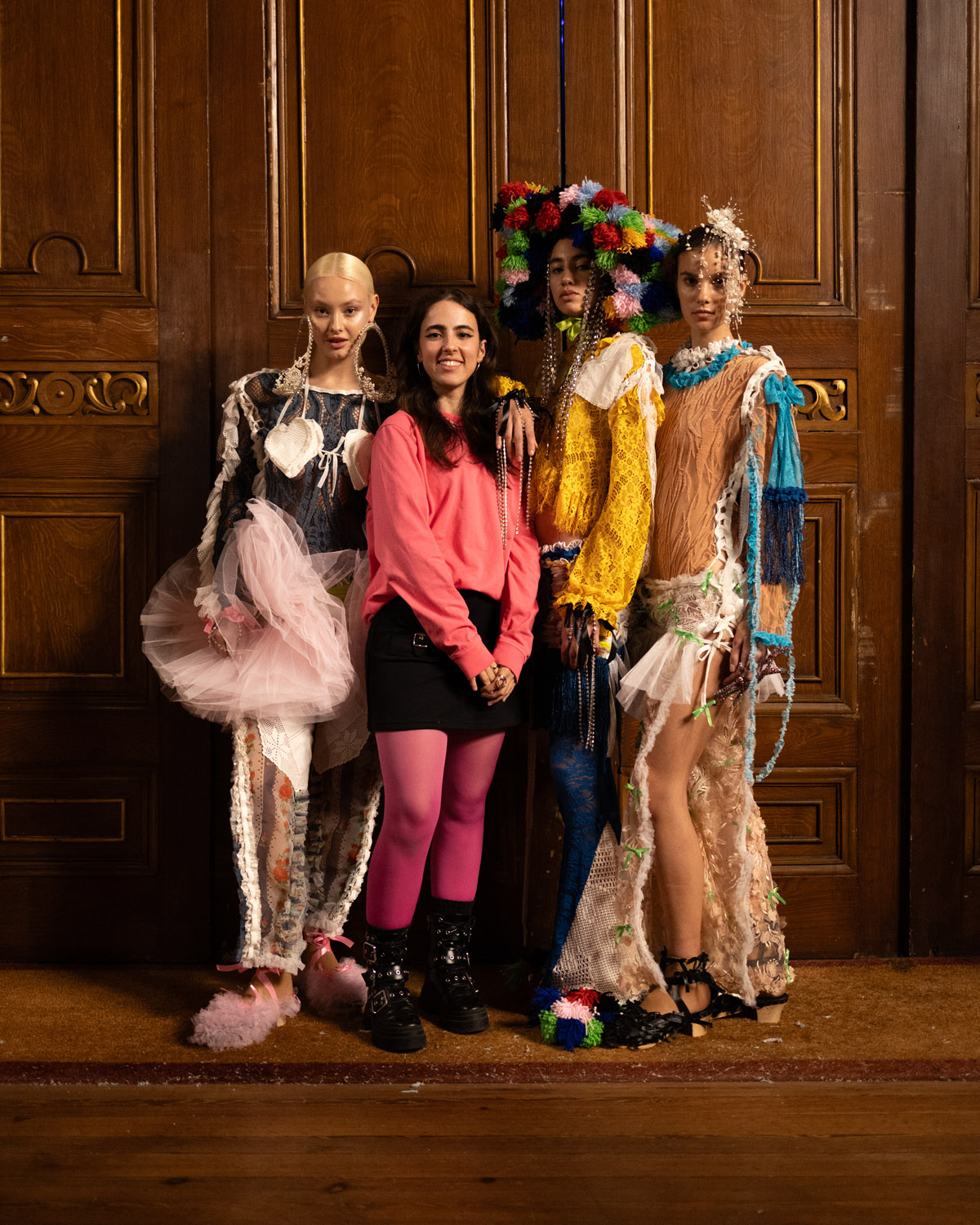
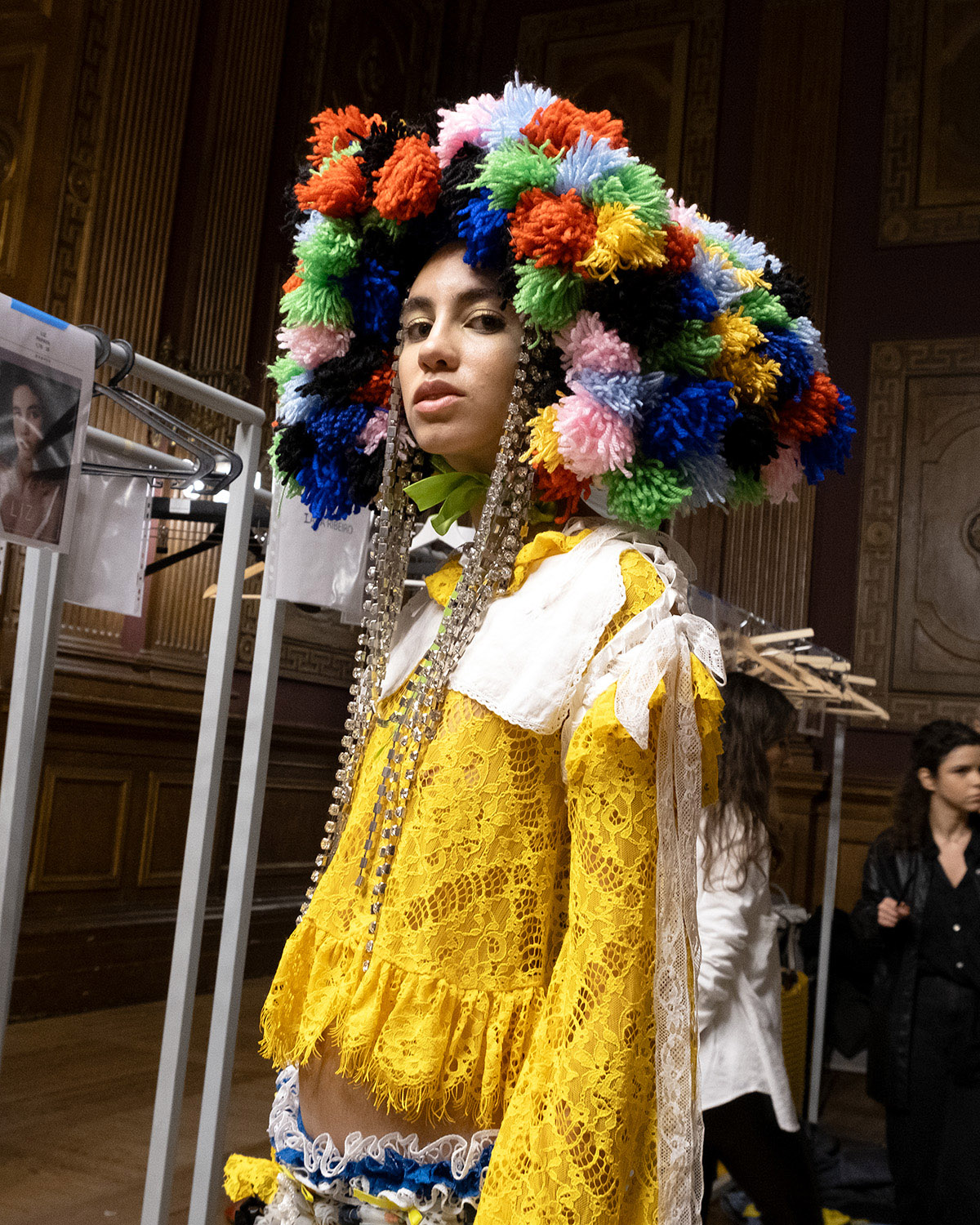
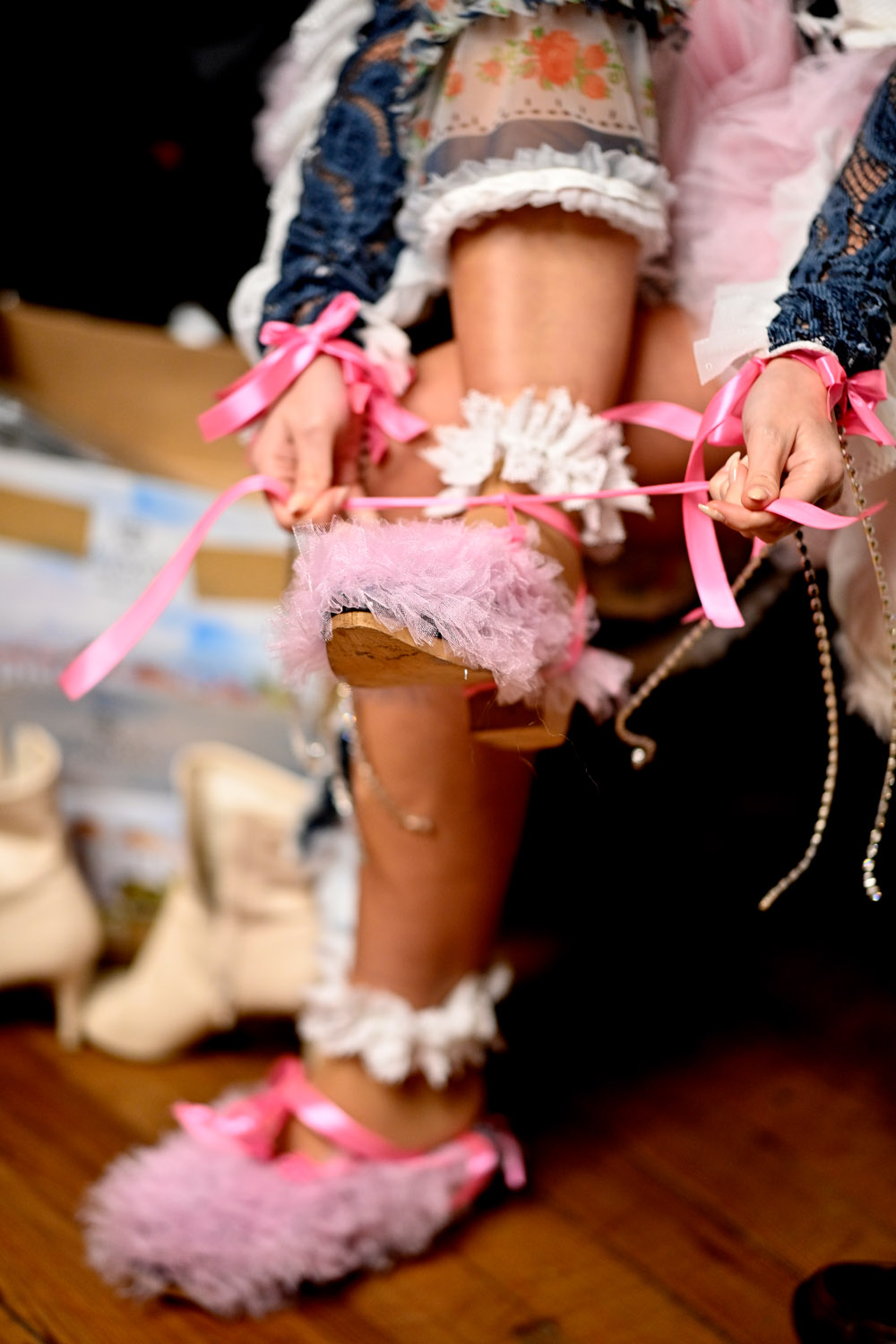
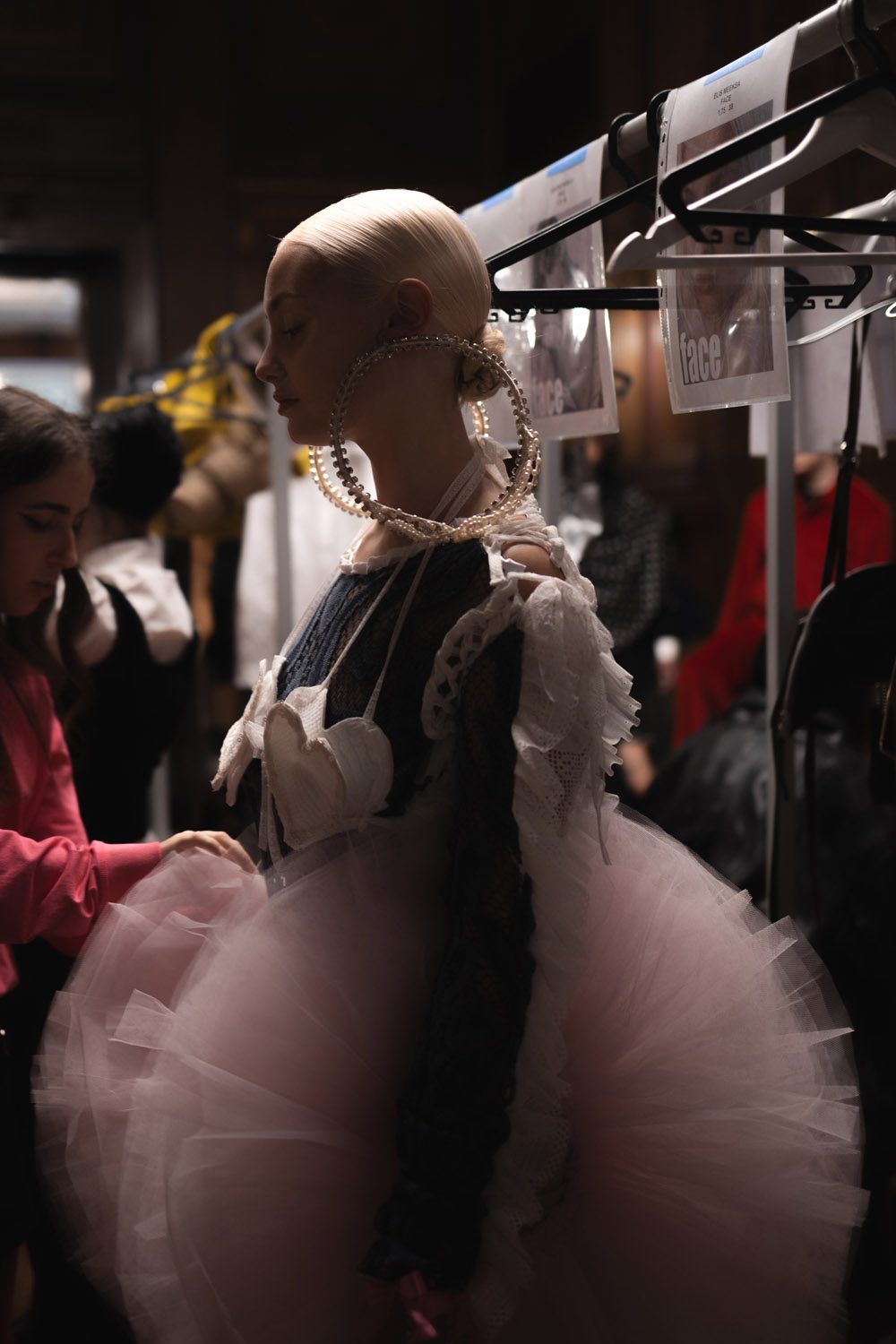
TOP LEFT
Photography – Luís Miguel Fonseca
TOP RIGHT
Photography – Lena Hunter
LEFT
Photography – Pretonubranco
RIGHT
Photography – Luís Miguel Fonseca
Maria Nunes‘ VIROU pays a collage-like tribute to Barbie, TV, reggaeton, and the folklore and dance traditions of Portugal. The collection features a unique print inspired by the Nazaré doll using a pink chita pattern, alongside a traditional chita print on polyester tulle instead of the usual cotton.
IARA RIBEIRO
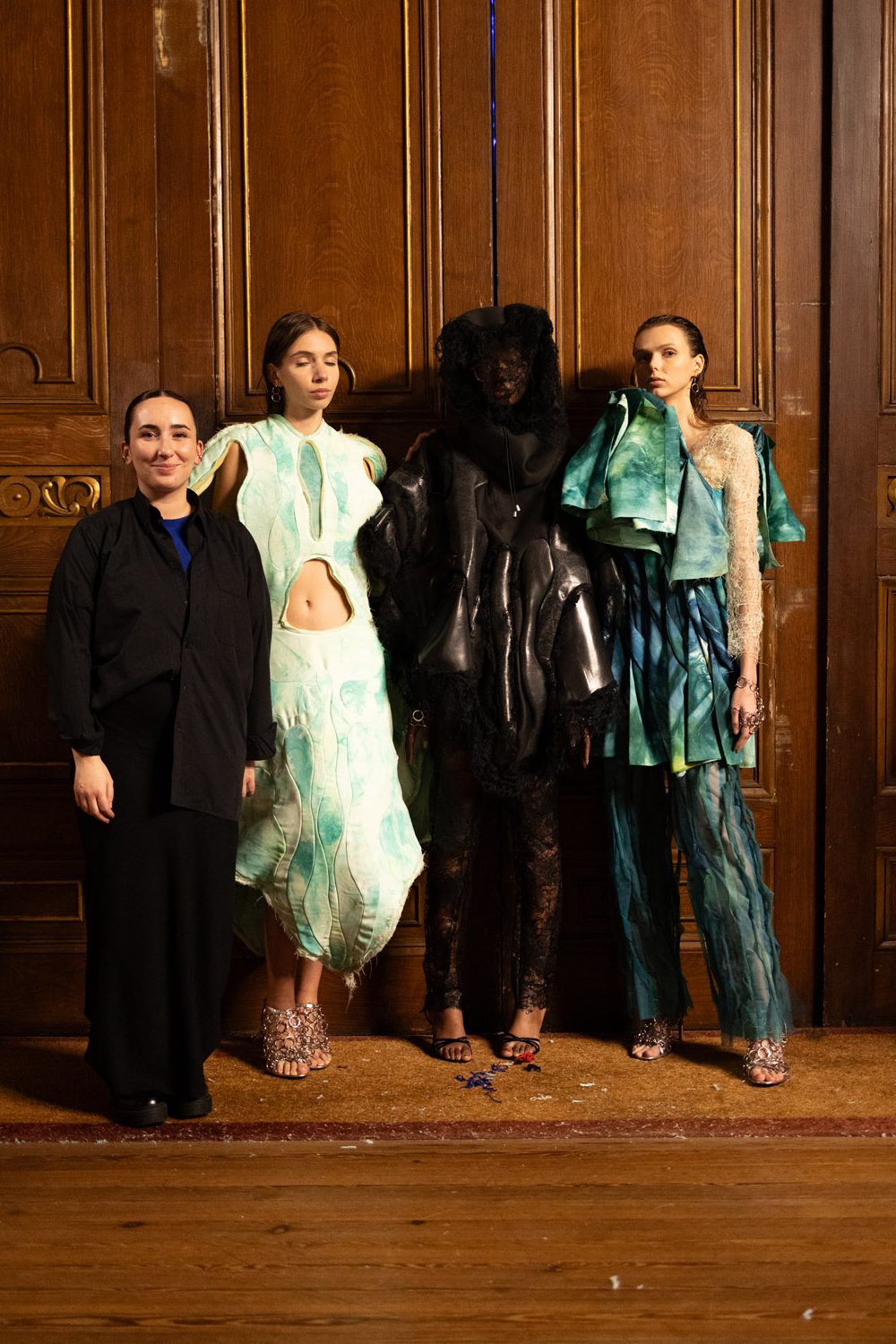
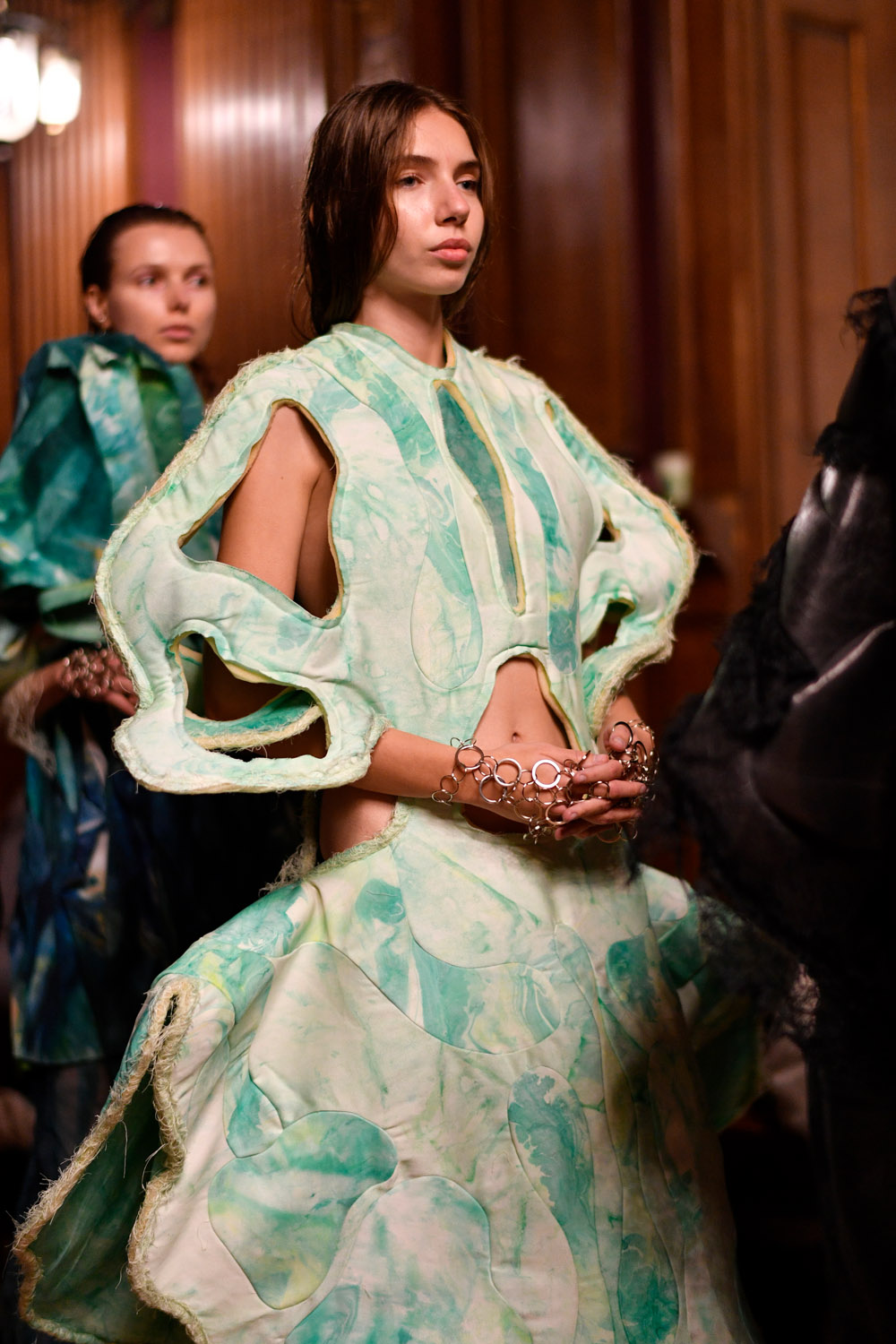
LEFT
Photography – Luís Miguel Fonseca
RIGHT
Photography – Pretonubranco
Iara Ribeiro‘s Brains Heal Brains collection reflects on how dementia brings about the gradual fading of memories, clarity and the self. Ribeiro’s design philosophy centres on using fashion to evoke unexpected sensations and bring about elusive emotions.
RITA ARAÚJO
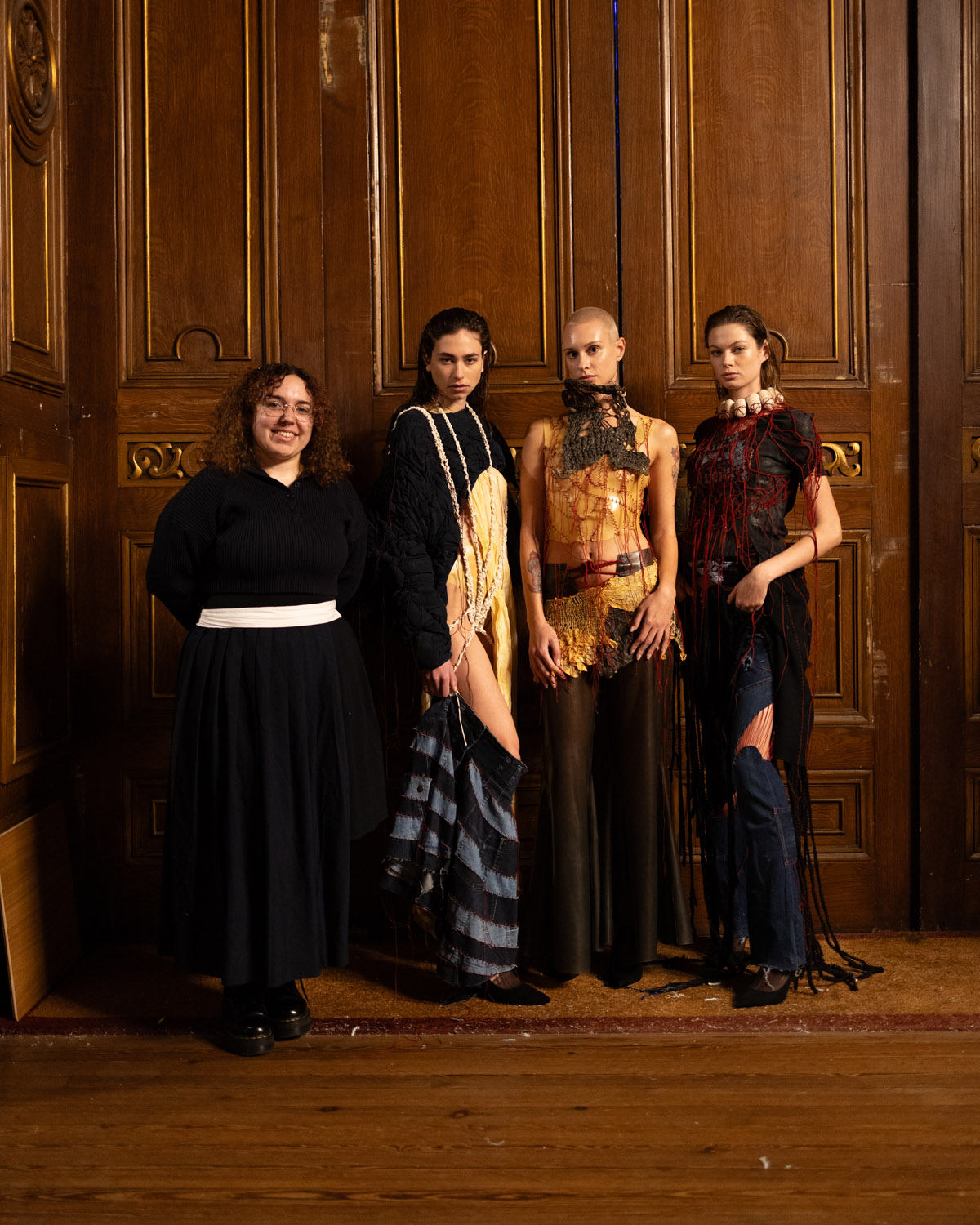
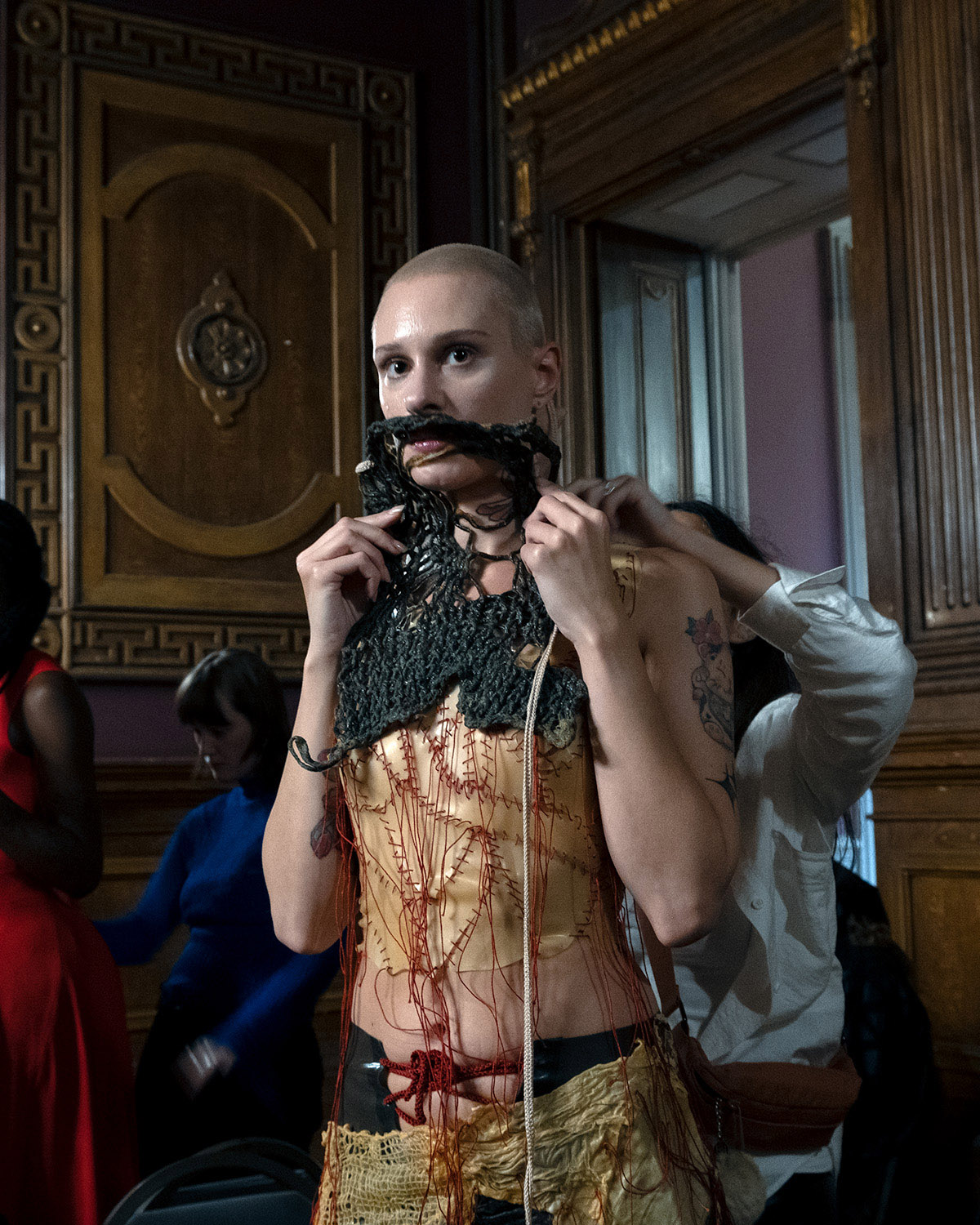
LEFT
Photography – Luís Miguel Fonseca
RIGHT
Photography – Lena Hunter
Rita Araújo’s work addresses the inhumane practice of female genital mutilation, which affects babies and young girls in some parts of the world. This collection mobilises design as a form of social activism, voicing the message that girls and women have the right to experience pleasure and lead normal lives.
PANEL
Eduarda Abbondanza – President and Creative Director of ModaLisboa and guest professor of the MA in Fashion Design at Faculdade de Arquitetura de Lisboa.
Johnson Gold – Founder of PAUSE online, a multimedia platform showcasing content across various industries, featuring interviews with artists, designers, musicians and other cultural figures.
Mira Wanderlust – MA Mentor and Lecturer in Visual Arts + Cultural Identity in Fashion Styling and Art Direction at Moodart, Special Projects Manager of Red Eye, founder of 33 Magazine.
Serge Carreira – Director of the Emerging Brands Initiative at the Fédération de la Haute Couture et de la Mode in Paris, and affiliated Professor at the School of Management and Impact of Sciences Po.
Jenny Hytönen – Finnish fashion designer renowned for her fusion of performative art and underground aesthetics, and her integration of traditional craftsmanship techniques with high-tech innovations.
Miguel Flor – An independent creative director, photographer and editor working with ModaPortugal. Flor is also one of the country’s most renowned mentors to young fashion designers.
Credits
EDITOR
Lena Hunter
PHOTOGRAPHY
Inês Brochado
Lena Hunter
Luís Miguel Fonseca
Pretonubranco
